General Insurance Blogs, Articles & Updates by - Magma HDI
Have us call you
- RENEW YOUR POLICY
- BUY NEW POLICY
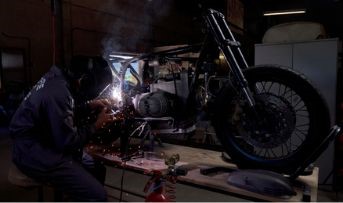
Here are a few top motorcycle welding tips to get the best results
Motorbikes have been an essential mode of travel for decades now. They are not only cost-effective but also justify the style quotient. Most people like customising their motorbikes and replicating their creativity on their bikes. And, welding is one of the best ways to make customisation easy.
If you like customisation, welding is an activity you can enjoy. Instead of toying around with your motorbike to the garage, you can do it yourself. You'll not only save a few bucks this way, but you'll also have a chance to design your bike in the way you want.
If you are a beginner, fret not! Follow this article to learn more about welding. We have listed all the information that will help you get the best results for your motorcycle welding. Additionally, you should also keep in mind that your motorcycle is precious to you, and you should have bike insurance that secures it at all times. This way, even if something unexpected occurs, you'll have something to fall back upon.
What is motorcycle welding?
Welding typically refers to the fusion or culmination of two materials. Either plastic or metal can be used for welding purposes. Metal is used most commonly.
The popularity of motorcycle welding has reached new heights in recent years. Most customised bikes that grace the roads have some modified motorcycle frames created through welding. Nowadays, most people have also taken it up as a hobby to get their hands dirty and give their motorcycle a fresh look.
Tips for effective welding:
The various tips and tricks that you can follow for effective motorcycle welding are as follows:
1. Manage contamination:
The surface plays a crucial role in welding and should be prepared in advance. You should ensure that it is free of contamination, like dust, dirt, or rust. Contamination can hinder welding quality, and many issues can occur if the weld penetrates the base material altogether.
2. Heat management:
Heat management is crucial for effective welding. The thinner materials or panels can be greatly affected by heat. It can even distort several frames if they're too thin. All in all, the heat levels should be checked at all times. If the welds are out-of-position, you should weld in the uphill direction. Due to this, the heat will be distributed evenly without any issues.
3. Be prepared for pipes:
If you're a beginner at motorcycle welding, you'll probably not know about welding pipes. Pipes are used majorly for all the frames used in motorcycles. However, it is noteworthy that welding a pipe is tricky and cannot be treated like a normal weld. It is difficult to fully weld around the circumference of a pipe without committing a mistake. You can try welding the pipe separately a few times to tackle this problem. Another way is to find equipment that will rotate the pipe while your welding machine stays in place. Either way, you'll be able to tackle the pipe welding problem.
If you're a fan of experimentation, welding can work wonders for you. It is important to have a clear idea about motorcycle welding before diving into it. You should remember all the tips and tricks to derive the expected outcome. Stay alert and ensure your and your bike's safety during welding parts. Always wear gloves and a face shield to protect yourself from getting injured. You should also look after your bike's safety and ensure that you don't damage any part of the internal machinery while welding. Purchase bike insurance to compensate in case of damages done due to accidents.
Click HERE to buy reliable bike insurance to provide the best coverage to your bike.
Disclaimer: The information provided above is for illustrative purposes only. To get more details, please refer to policy wordings and prospectus before purchasing a policy.

Beware of those selfies you might be going for in dangerous locations
The youth of today believe in capturing every moment. Thanks to technology advancements, photographing a memory takes only a few clicks. With the onset of the age of social validation, clicking unique pictures is the way to stand out in a crowd. People have gone to lengths trying to capture a perfect moment. The results are sometimes outstanding and, other times, an invitation to danger. In this article, we will discuss how selfies have taken a dangerous turn in the past and how to look out for your safety while clicking pictures.
Over the years, we have seen a rapid rise in the use of mobile phones in the country. Be it for communication or the accessibility that a phone brings, people of every age group have invested in a smartphone. What comes as a shock is that India has a record number of deaths caused by selfies. News about people drawing, falling off a cliff, and car accidents became part of our daily lives.
How do we avoid these situations? Let's take a look at how.
1. Maintain a safe distance:
If you intend to take selfies on a bridge or a high-rise area, it is best to maintain a distance of a few feet to ensure your safety. The weather at such locations is highly unpredictable, making the site more challenging to manoeuvre. Avoid leaning too far, and stay away from the railings. If you want to catch the view more closely, invest in a sturdy and good-quality selfie stick that can be extended further. This way, you can rest assured that you are getting the best picture while being safe and responsible.
2. Avoid busy roads:
The roads in India are almost always crowded with people and vehicles. Everything starting from pedestrians to rickshaws and trucks, take the same road. To avoid congestion and accidents, avoid taking selfies on overcrowded roads. Not only are you putting yourself at the risk of getting hit by a vehicle, but you are also running a risk of mugging and robbing. It is best to keep your phones and cameras inside your bag for safekeeping.
3. Avoid water bodies:
The beautiful picture of water washing your feet and waves crashing from across is a sight to behold. But did you know that most selfies-related accidents occur by drowning? If you want to take images around beaches, rivers, or waterfalls, maintain a safe distance from the water. Water is powerful and is capable of dragging you with it. Being mindful of your surroundings will keep you safe and help you revel in the beauty of the space.
4. Be present at the moment:
No matter the number of selfies you take, none of them will be as meaningful as the experiences of exploring a new place. Try to interact with the locals and understand the place's culture to make lifetime memories. Explore new food options and learn how to make them, and do not forget to collect souvenirs as memories from the journey.
These were a list of simple tips that you can follow to keep yourself safe while clicking selfies. Remember that being mindful of your surroundings and taking adequate steps to ensure your safety is crucial when exploring new places. If you find yourself in situations like these, get help as soon as possible. And to cover the costs of such accidents and mishaps, invest in the best personal accident insurance India. Personal accident insurance is a smart way to safeguard yourself against accidents and the costs incurred. Stay safe and ensure the safety of people and places around you.
Click HERE to buy the best personal accident insurance India.
Disclaimer: The information provided above is for illustrative purposes only. To get more details, please refer to policy wordings and prospectus before purchasing a policy.

Look out for these smart tips to save money on medical costs
Expenses on medical treatments are usually unavoidable. All medical costs, from medications to various tests, require a considerable sum, which is an emergency crisis for most families. Healthcare costs can quickly cause worry, stress, and debt, but there are easy ways to avoid such situations. Health insurance is the best way to secure your finances. There are various types of health insurance in India for parents, partners, families, etc.
Thus, this guide will help you learn different tips to save money on medical expenses and stay in the best peace of mind.
1. Check the price of your healthcare providers and tests:
Healthcare costs differ a lot according to different providers. You can find healthcare providers' fees and extra facility charges with the cost estimator tools on your insurer's online portal. Compare the pricing and choose a more affordable option. It will make a massive difference in your pocket.
2. Know your health insurance plan:
One of the most beneficial ways to save money on medical costs is to know your health insurance plan. Carefully read your health insurance policy features and the expenses it covers. Examine whether you have a co-payment option requiring you to pay a deductible before your insurance starts to pay.
Check what and how much your health insurance in India for parents or family covers. Know the list of medications and test your insurance coverage, which can help you avoid unexpected expenses.
3. Know which medical services are free:
Per the Affordable Health Care Act, patients or people with insurance can avail of certain healthcare services for free until they are in the network. Such healthcare services are preventive services that help a person maintain their health, which may include:
● Blood pressure screening
● Vaccinations
● Diet counseling
● Depression screening
● HIV prevention medication
Some medical services are also free for children, such as eye tests, newborn blood screening, wellness visits, fluoride varnish, etc.
4. Opt for a top-up cover:
Avoid taking out an additional policy if you already have health insurance but are still looking for a higher-cost plan. You can take a top-up cover that will offer additional coverage you need with considerable savings on your insurance. However, you can do this by taking out critical illness insurance, saving money without compromising coverage.
5. Go for generic medications:
Generic medications are usually cheaper than prescription drugs. Getting generic medicines can help you save on your medical bills. But you must ensure that your health insurance plan covers your generic medication.
6. Take separate cover for your parents:
Usually, the amount of insurance in family floater cover is calculated according to the age of the oldest person. If you include your parents in the same insurance plan, it may increase the insurance premium. However, you can go for separate health insurance in India for parents, which can help you achieve savings.
7. Stay healthy:
Lastly, you can save money on medical expenses by staying fit and maintaining good health. It will help if you avoid alcoholic substances, smoking, and other dangerous things. You must invest your money in good things such as healthy food, regular exercise, staying positive, and a better sleeping schedule. You can also find a trainer who can help you exercise according to your convenience to maintain health.
Healthcare expenses can put a significant burden on your pocket. With the tips mentioned above, you can save considerable money. However, the best way to keep your money on healthcare expenses is by taking a health insurance plan with comprehensive coverage at an affordable price. Also, look for reliable health insurance in India for parents that fulfills your requirements to ensure the sound health of the entire family.
Click HERE to buy health insurance in India for parents.
Disclaimer: The information provided above is for illustrative purposes only. To get more details, please refer to policy wordings and prospectus before purchasing a policy.
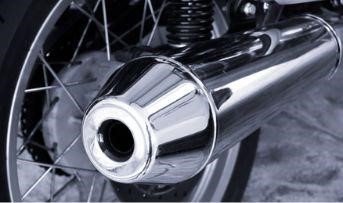
Here are the consequences of installing pressure horns and modified silencers on your bike
Many young bikers love to install pressure horns and modified silencers on their bikes to show off, seek attention, stand out in a crowd, and make their presence felt. It is their style statement and a way of saying they have arrived.
However, people around you can get distracted and panicked when you suddenly blow your high-decibel pressure horn in a crowded street. They may lose their balance and control, may swerve, and meet with an accident.
Here are the consequences of installing pressure horns and modified silencers on your bike.
1. Fines:
The Motor Vehicles Act of 1988 is an act that consolidates and amends the laws that govern motor vehicles and their running in India. According to the amendment of section 190(2) of the Motor Vehicles Act in the year 2019, causing air and noise pollution by installing pressure horns and modified silencers on your bike can attract a penalty of up to Rs.10000/- and imprisonment of up to six months. This fine will be imposed if your pressure horn or modified silencer produces more than 80 decibels of noise.
2. Functioning and mileage:
Other than attracting fines and penalties, we should also consider the consequences of installing pressure horns and modified silencers on the functioning of our bikes. Pressure horns create undue load on the battery of our bike. It can make it weak and damage it in the long run. If we have not used the bike for long and the battery is not charged, using the pressure horn in stationary mode can kill the battery. You will not be able to use the self-start option in this case and get stuck.
Installing modified silencers may sound cool, but it can worsen the mileage of your bike by around 15%-20%. Modified silencers directly impact the engine pulling capacity of your bike. You may need to go for an engine tuning too. An acceleration tuning setting of your engine due to a drop in its pulling power can lower the mileage of your bike.
Modifying silencers will also involve changing the original angle of the exhaust opening. This may increase the total length of your exhaust pipe and the number of bends in it. Both cases lead to a lowering of the velocity of gases movement in the exhaust, resulting in a higher generation of emissions. Higher emission means higher fuel consumption.
Hence, be ready to shell out more on your fuel cost with modified silencers. Also, it can damage your bike engine too in the long run.
3. Drain on your wallet:
No modification to your bike comes for free. The same applies to installing pressure horns and modified silencers on your bike. A pressure horn can cost double the regular horn in a bike or even more. Garages charge hefty amounts starting from INR 2500 and above for silencer modification of your bike.
Installing pressure horns and modified silencers on bikes is usually a style statement for the young generation. Bike enthusiasts love to fiddle with their bikes and make them look fancy. Customising the bike can make you stand out in the crowd. However, such modifications pose a negative impact on the environment and people. We should understand that high noise emission often leads to nuisance creation on the roads and disturbs people around us.
As a responsible driver and law-abiding rider, always follow the traffic rules and avoid the above modifications, which may land you in trouble. Also, be sensible to have two wheeler insurance online India to avoid any financial hassles against mishaps and accidents. Premium amounts can be easily compared between various policies and involve no paperwork. Also, it secures and covers you like any other offline policy without compromising quality.
Click HERE to buy your two wheeler insurance online India.
Disclaimer: The information provided above is for illustrative purposes only. To get more details, please refer to policy wordings and prospectus before purchasing a policy.

Complete guide on rev matching on bikes
In India, the majority of motorcycles lack a slipper clutch. While learning motorcycle, many people find it challenging to downshift correctly. The engine comes under stress because they typically downshift while holding the clutch, which results in the higher gear accelerating harder than the lower gear at the same speed. To match that speed on the lower gear for a seamless transfer, one should preferably rev a bit higher before downshifting. Otherwise, you would be "engine-braking," which is not an intelligent way to slow down.
The correct way of downshifting is to blip the throttle between shifts to match the revs to the speed. This is also known as revving. In this post, we are talking all about it. So, without further due, let's get into it.
How to rev-match correctly?
● As you press the brakes, hold the clutch and downshift as you start to slow down (do not release the clutch yet).
● Now, "blip" the throttle while maintaining clutch pressure to increase engine RPM gently.
● As soon as the engine starts to rev, let go of the clutch instantly.
● Don’t forget to keep carefully applying the brakes. When you downshift, the aim is to match the revs needed for the bike to move at that precise pace.
● If your bike jerks and slows down unexpectedly, it means that the engine's RPM wasn't high enough. Try to rev it up further the next time you try it.
● The last step would be to practice and practice. Getting it right the first time is not necessary. Don't give up. You will learn how to downshift with time.
The importance of rev-matching.
Now that you know what occurs when your motorbike is rev-matched, let's talk about its significance. Downshifting without rev-matching may cause a significant shock in the motor while travelling at high speeds, especially on large bikes with high horsepower output. The result will be a back wheel that hops, skips, and steps out of alignment. In a scenario like this, controlling the motorcycle at high speeds requires excellent control and precision. The shock won't be as extreme or dramatic on motorcycles with less power, but it still has the potential to cause an accident.
Matching your RPM reduces engine wear and tear, yet another crucial justification for rev-matching. The shock that results from improper rev matching puts more strain on the engine and gearbox, among other parts.
Does rev matching consume more fuel?
The forceful use of the accelerator does cause it to use somewhat more fuel, but only little than usual.
If done properly, rev-matching can assist you in downshifting efficiently and reduce stress on your engine and clutch. It's a tactic that bikers employ frequently. It's crucial to keep in mind that you don't have to match your revs perfectly at first when you're practicing. To master, like with any other ability, rev-matching needs considerable practice. You will eventually be able to tell when your engine and road speed are in sync.
Take your first step towards rev-matching today, and don't forget to be safe. Riding on roads is always an invitation to mishaps that may be a potential threat to you and your bike. Always stay alert while riding, wear a protective gear helmet, and avoid overspeeding. Do not forget to invest in the best bike insurance for an additional safety net over your bike. Buy bike insurance online today and gift yourself with benefits that will eliminate the financial stress off you during panic situations.
Click HERE to buy bike insurance online and get rewarded with effective benefits.
Disclaimer: The information provided above is for illustrative purposes only. To get more details, please refer to policy wordings and prospectus before purchasing a policy.
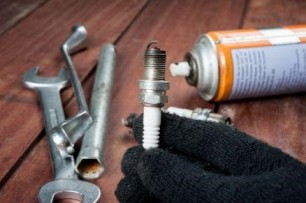
Complete guide to changing the spark plug of your bike
If you are a biker, you know the importance of maintaining your bike in top-quality condition. Some people learn ways to keep their bikes on their own, while others depend heavily on mechanics and service stations to maintain their vehicles properly. In this article, we will understand the functions of one of the most vital components of a bike, the spark plug, and how to maintain and change it.
What is a spark plug?
A device that delivers electric current to the combustion system via the ignition point is known as a spark plug. A spark plug ignites and fuels the vehicle using an electric spark while maintaining the engine pressure.
What key dimensions do you need to look for in a spark plug?
1. Diameter:
The right diameter is imperative for the proper functioning of the spark plug. The wrong diameter can affect the internal components and damage the bike.
2. Reach:
The spark plug's optimal range or reach determines its ignition capacity. If the length of the spark plug is too short, it will fail the ignition. And if it is too long, it might ignite pre-emptively or get jammed and hit the valve inside.
3. Range:
The range of the spark plug is calculated by the distance from the insulator's tip to the ceiling ring. A longer distance will heat the plug and cause pre-ignition, while a shorter range results in a colder plug resulting in easy wear and tear.
4. Gap:
The distance between the centre and the grounded electrode is known as the spark plug gap. The bigger the size of the gap, the bigger the spark produced.
What are the indicators of a damaged spark plug?
1. When you stop the bike, and the engine starts sputtering or idling, it indicates a failed spark plug.
2. If you have trouble starting your bike engine, it could indicate trouble with ignition and the spark plug.
3. If you notice corrosion in various parts around the spark plug, then it is high time to change your spark plug.
4. You might have a faulty spark plug if you notice a poor fuel economy.
Various other factors are indicators of a faulty spark plug. If you notice any problem while riding your bike, it is best to take your vehicle to a mechanic and inspect it as soon as possible.
How to change a spark plug at home?
Although it is advisable to make any changes to your bike under the supervision of a trained mechanic, if you want to change your spark plug, the following list will help you with that.
1. The first thing that you need to do when changing a spark plug is to pull the cap and remove the wire. Remember to do it gently, as a sudden tug or pull can damage the connection and prevent the ignition from happening.
2. Attach the ratchet to the plug and make sure that the plug is fitting properly inside the socket. Using the ratchet, turn the spark plug till it is loose, and then carefully remove it.
3. Inspect the plug for oil and soot deposits or other damage. If the spark plug is greasy and dirty, it is high time to change it with a new one.
4. Before fixing a new spark plug, it is better to check for the range, diameter, and space of the spark plug. The exact spacing of the spark plug will be mentioned in the user manual.
5. Clean the new spark plug and place it neatly to ensure it fits properly.
6. Tighten the spark plug and put the cap back on.
These were the steps you need to follow when you want to change the spark plug of your bike. Remember that if you notice any abnormality with your bike and experience trouble while driving, it is best to get it checked by a mechanic. Invest in bike insurance to safeguard yourself against the cost of repair and maintenance. Bike insurance adds value to your bike and helps you gain a better riding experience with more focus on security and less financial stress.
Click HERE to buy bike insurance.
Disclaimer: The information provided above is for illustrative purposes only. To get more details, please refer to policy wordings and prospectus before purchasing a policy.

Learn about the best tips for ensuring the safety of maintenance workers
Maintenance workers are a highly underrated and neglected section of any organisation until a problem arises. Their day-to-day work requires many risky tasks as they have to come close to machinery or processes and repair them.
Such activities may include the disassembly and reassembly of complicated machinery. The chances of accidents are always high for them as maintenance activities are usually unplanned and involve the possibility of human error.
Let us learn about the best tips for ensuring the safety of maintenance workers.
1. Plan and stick to a schedule:
Maintenance activities should always be planned in advance so that workers get time to do a risk assessment and be mentally prepared for it. A regular safety check schedule should be put in place so that the maintenance workers know in advance the potential hazards of the task.
The tools and personal protective equipment (PPE) should be checked for safety on a routine basis. Proper planning and making a schedule for safety checks will also help the maintenance workers to sharpen their work skills according to the specific needs of the task.
2. Authorisation:
The proper authorisation should be in place for the operation of critical machinery. Only a few should have authorised access to critical work areas or permission to go near critical and complicated machinery. Power should be turned off when the machines are not working. The proper authorisation will ensure that no one turns on machinery or part of it while the maintenance workers are working on it.
3. Appropriate equipment:
The management should ensure that the maintenance workers have the appropriate equipment to perform their tasks. The workers should also consistently check on their equipment, whether a small drill machine or a welding machine. It should not happen that equipment fails to operate while performing a maintenance process and puts the worker and his team in danger.
The management must also ensure that they constantly upgrade and modernise the equipment to match the need of the hour and are not obsolete.
4. Working as a team:
Maintenance works are usually sudden and critical in nature. They come up when something important, such as the main production process, has stopped. The maintenance workers should work as a team because a lack of coordination in maintenance activity may lead to accidents and injuries.
The team should follow all the required safety processes and protocols. Also, they should do a thorough after-use check of all the critical equipment and tools they use. This will ensure the tools are fit for the next maintenance assignment.
5. Final checks and inspection:
The maintenance workers should thoroughly inspect the repair work they have performed. They should do a trial run of the machine only after they are fully satisfied with their work and are sure that everything is back in order. This will ensure their safety as otherwise, they may meet with an accident in case of incomplete repair work.
Maintenance workers are an essential part of an organisation's workforce. They put their lives at risk to fix the errors and bring back life to the stopped processes. While ensuring the safety of the maintenance workers, any company must also go for public liability insurance. It will protect the company if any third-party liability arises from accidents, injuries, or property damage.
Public liability insurance prices vary with a business's individual needs and the scale of its operations. One should compare the prices of policies available with different service providers and then make the purchase decision accordingly.
Click HERE to learn more about public liability insurance prices in India.
Disclaimer: The information provided above is for illustrative purposes only. To get more details, please refer to policy wordings and prospectus before purchasing a policy.
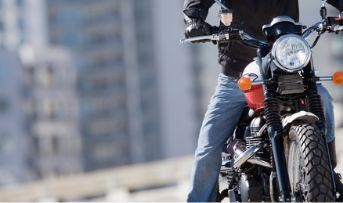
Know how you should ride your two-wheeler in the break-in period
Purchasing a vehicle is a big decision. It takes lots of planning, comparison of available options, and budgeting to arrive at the final pick. This applies to both cars and two-wheelers. Despite being significantly smaller and cheaper than their 4-wheeled counterparts, the extensive options in the market make it a tough choice for two-wheeler buyers. The ultimate decision depends on the budget and purpose of purchasing two-wheelers.
While it is mandated to buy two wheeler insurance India before hitting the road, once the paperwork is ready, all that’s left is for you to enjoy comfortable rides!
But there is one more piece of information you need to be aware of, i.e., Motorcycle Break-In. Does break-in sound unfamiliar, or are you wondering about its need? We’ve got all your questions covered below!
What is the breaking-in period?
The breaking-in period lasts for the initial 800 to 1600 kilometres for which the two-wheeler is driven. In simple words, it is the period it takes to get the new motorcycle running at its smoothest and allow the rider to get used to the vehicle.
Why is it necessary to break-in?
Breaking-in may seem like an unnecessary classification of a period that you can do away without any consideration. However, how the bike is operated initially impacts its running in the long run.
When a motorcycle is produced and advertised for sale, it goes through strict inspections and quality checks that guarantee the end user of its useability and safety. The main component of the bike, the engine, is fitted with several small parts that glide together smoothly to result in a perfect performance. This is facilitated by the ideal compression ratio, which is only possible if the engine fuel does not spread over the engine walls. Breaking-in correctly ensures that the piston, valve, cylinder walls, and piston rings generate friction such that a tight seal prevents the leak of fuel.
The benefits of proper breaking-in can be summarised as follows:
1. Lower carbon emissions
2. Optimised fuel usage
3. Longevity of engine life
The don’ts of two-wheeler break-in.
1. Don’t ignore the manufacturer’s instructions and take the word of other self-proclaimed experts.
2. Steer clear from rash driving under the false pretext that it would benefit your engine. It will only accelerate wear and tear and make the bike risky.
3. It is legally enforced to buy two wheeler insurance India immediately upon purchasing the vehicle before it is used. Ensure that you do not start the process without insurance.
The right way to ride your two-wheeler in the break-in period.
The proper technique of breaking-in subjects the engine to different stress levels such that the components adapt to each other and develop friction between themselves to create the perfect seal that prevents fuel spills. If the manufacturer has provided instructions, follow them to derive ideal results. In the absence of such instructions, follow the below-stated steps:
● Identify a comfortable stretch that allows shifting speeds and gears. Empty roads or highways are ideal
● Stick to the max speed of 50 Km/h and strictly ride without a pillion
● Use at most 3/4 throttle
● Alter gears with increasing speeds and do so gradually
● Ensure gradual breaks or acceleration instead of jolts
● Constantly monitor your bike’s engine speed and pay attention to your gear engagement to prevent motor lugging
● Allow your bike’s engine to cool down every 30 minutes while breaking-in to allow it to retain its shape
You can ensure a perfect break-in by keeping the above points in mind and following the instructions in your two-wheeler manual. Before you start the process, ensure that you buy two wheeler insurance India to protect your bike against any damages.
Click HERE to buy the best two wheeler insurance India.
Disclaimer: The information provided above is for illustrative purposes only. To get more details, please refer to policy wordings and prospectus before purchasing a policy.

Here are some strange facts about your body that you should know
The human body is the basis of all sustenance. All your organs are arranged in a highly complex manner and have been connected to derive energy from each other’s functionalities.
Every day, thousands of scientists across the globe conduct further research, trying to discover new things about the body which help us thrive even in the worst of circumstances.
You might have read about human anatomy in your school and college, but we bet there are many weird things about the human body that you might not know. Intrigued? Here are some strange facts about your body that you should know. Let’s get started.
1. Did you know that babies have 300 bones during birth instead of the usual 206 bones that develop over time as you grow older? A baby’s bones are delicate, and their bodies have bones half-made of cartilage.
2. The longest bone of your body, called Femur, is located in your upper leg and can manage almost thirty times your body weight.
3. The saliva your body makes every day, if collected for an average lifetime, can fill up to twenty thousand litres, roughly accounting for two giant swimming pools.
4. Almost twelve percent of people dream of monochrome (black and white). This had significantly reduced from fifteen percent before colour televisions and media took over. It is quite intriguing to observe how colour media has influenced the dream patterns of human beings apart from other impacts they have caused on our lifestyles.
5. You are more prone to heart attacks on Mondays due to the sudden stress you face as you get back to work. Your body gets a little relaxed over the weekend, and the pile of work at the beginning of the week creates sudden tension in your body. Plus, having excessive alcohol in your weekend plans makes your body vulnerable to heart attacks.
6. You are usually taller when you wake up in the mornings! This happens due to the compression of bones’ cartilages during the day. So, the body relaxes at night, and you are a little taller in the morning. An ode to gravitational force, it seems!
7. Ever wondered why permanent tattoos are so hard to remove? That’s because they are ingrained in your nerves and not on the top layer of your skin. Permanent tattoos take their space in your immune system, so lasers must be involved for their removal. Using lasers kills the cells, and the remaining ink released is processed by macrophages, which also helps heal the laser injuries. The tattoo takes a few sessions to start with the fading process.
8. See your hand. You see that little finger, or as you call it, your “pinkie” finger? Research has found that the maximum strength of your writing lies in your little finger, and you would lose fifty percent of the power if you lost that pinkie. Who would have thought?
We hope these facts amazed you and catered to your curiosity about your body. And while we are on the subject of strange facts, we must not forget that health is wealth, and if health is lost, nothing stays the same. You must take good care of your physical and mental health by eating right, staying safe, exercising, etc.
Also, you must stay prepared for unforeseeable circumstances you might find yourself or your loved ones. There can be no better investment than investing in your health. If you are in the best of your health, you can achieve all your aspirations and get the maximum returns. Health insurance is the right way to approach such situations. Explore your options and purchase the best health insurance policy in India which best suits your needs and provides comprehensive coverage.
Click HERE to know more about the benefits of the best health insurance policy in India.
Disclaimer: The information provided above is for illustrative purposes only. To get more details, please refer to policy wordings and prospectus before purchasing a policy.
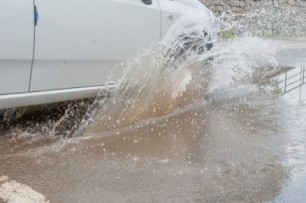
Here are a few things you need to know while driving through a flooded road
Monsoon is here, and it is the much-needed respite from the scorching heat of the summer months. A hot cup of tea and a bowl full of crispy fried fritters are a great accompaniment to the pouring rain. But as refreshing as the monsoon rains are, the hindrance it causes to people's daily lives is inevitable and frustrating.
Rain brings many issues: power outages, poor internet speeds, flooded roads, and delayed meetings. We will look at the few ways you can tackle flooded roads and how to drive through the heavy downpour safely.
1. Do not stop:
If you are in a flooded area, waiting for the rain to pass might not help. Chances are, the rains will get heavier, and the roads will be filled with more water. Under these circumstances, it is best to keep moving steadily. Do not accelerate quickly or halt suddenly. Water entering the crevices inside the car's chassis can affect the car's functionality. If water gets to the engine through the exhaust, you might have to change the engine altogether, which can be quite expensive.
2. Brakes and pumping:
Once you are out of the water-logged area, it is best to pump the brakes to eliminate any residual water that might have collected. Water or humidity in the brakes can affect the efficiency of braking.
3. Maintain a safe distance:
Being neck to neck with vehicles can be extremely dangerous when navigating through flooded roads. The vehicle moving ahead causes ripples that raise the water levels around your car. This can lead to the water entering the exhaust or the air intake.
Also, navigating through water-logged roads is very difficult, and one might not be aware of any potholes or bumps on the road. Sudden bumps can push the vehicle back, damaging the front of your vehicle.
4. Figure out alternate routes:
Although it is best to stick to familiar roads, in case of floods and rains, you might consider taking an alternative route. Not all routes are flooded equally, as some roads might have better slopes and drainage systems. Even if it's a longer route, it will be better for you and your car.
5. Do not panic:
Being stuck inside a car and unable to move can be daunting and create panic. Focus on getting to a safe place. You might not be able to open the door because of the force created by the water around your car. Under such circumstances, use any tool to pry open the windows.
Look for any tools that are easily available under your seat or inside the dicky. Tools such as jacks, wheel wrenches, and spanners are readily available inside your car. Do not try to break the windshield as they are harder to break than windows.
These are a few things that you need to keep in mind while driving through flooded roads. Once you are out of the situation, it is best to take your car to a service centre and get it checked for any damage. Repairing these can be expensive, but you don't have to worry about the expenses if you are insured by the best car insurance in India. Possibly opt for travelling by public transport during monsoon. It may sound daunting, but it is a wise option to commute rather than getting stuck in the middle of the road due to the breakdown of your vehicle.
Click HERE to know more about the best car insurance in India.
Disclaimer: The information provided above is for illustrative purposes only. To get more details, please refer to policy wordings and prospectus before purchasing a policy.

Business owner's guide to make their shops and stores safe for customers
Owning a business is a challenge, but with the right mindset and efforts, you can make the most out of it. Whether a small store in a quaint locality or a well-known brand with multiple branches, it takes time, capital, and decision-making to scale a business and generate profits. Irrespective of the nature and size of the business, an essential feature is customer service for its growth.
Whether a service provider or goods dealer, most of the business' work relates to relations with outsiders. Whether directly or indirectly, most businesses benefit from strong connections with suppliers, dealers, and customers. Since these stakeholders frequently visit your business premises, it is necessary to make your store safe.
Purchasing public liability insurance in India is a practical investment to prevent your business from shouldering the burden of injuries and damages to third persons on your business premises. Coupled with our tips to make your shop safe, you can guarantee the safety of customers visiting your office or store.
1. Security supervision systems:
Installing an effective and advanced security system is key to securing a store. This includes CCTV cameras outside to capture the exterior for any suspicious movement and abnormalities. Inside the store, these cameras should be placed at junctions to give a complete view of the shop. This prevents burglary attempts and also helps identify mishaps at the earliest.
2. Automated door and window sensors:
Automatic sensors on or near entry points like doors and windows are necessary to prevent unnoticed entry into the store. Additionally, they also help limit access to risky areas within the store. For example, specific storage space or cold room should be out of bounds for non-employees. The easiest way to ensure this policy is by setting up systems that instantly alert the proprietor.
3. Practical stocking of goods:
If you run a store dealing in goods, displays are essential to your store layout. If stocked improperly, customers risk getting injured due to falling goods. You must settle these cases at the earliest. Ensure your employees are well-trained to prevent such situations.
4. Hazardous goods in the store:
Depending on the nature of the business, you may have to store some hazardous substances like chemicals, manufacturing, or electrical parts intended for sale but of risky nature. It is essential to place them at a height that is not accessible to children. For added security, take cautionary notice around such goods to alert customers of potential risks.
5. Maintaining hygiene:
Keep your stores safe for customers. This includes regular cleaning to prevent slipping, sanitisation to avoid infectious diseases, and to provide a safe experience for them. Wherever required, ensure that anti-slip mats are placed and that any wet aisles have precautionary notice boards nearby.
6. Parking and storefront safety:
Parking areas and storefront space are also included within the limits of your place of business. While the above mentioned methods can keep customers safe inside the store, these external areas should also be accounted for. Ensure that the parking space is well-lit with clear directions. Wherever possible, use tactile pavements instead of smooth pavements or slopes to prevent customers from slipping in unfavourable weather conditions.
While there are some tips you can follow as extra precautionary methods to make your store safe for customers, the first thing you must consider is purchasing public liability insurance in India. It covers damages and injuries caused to a third-party or third-party property on the insured's business premises. It eliminates the liability on a business to compensate for accidental mishaps, which may take up huge bills. Public liability insurance in India is a valuable option that limits a business' liability to outsiders when damages happen by accident.
Practice these tips and make your shops a convenient and safe place for customers to enjoy shopping while being at peace. The better you serve your customers, the best outcomes you will get from your business.
Click HERE to buy public liability insurance in India.
Disclaimer: The information provided above is for illustrative purposes only. To get more details, please refer to policy wordings and prospectus before purchasing a policy.

Here are a few effective ways to defog your car windows during monsoon
Monsoon is here, giving us the perfect opportunity to take ourselves out on a drive and snack at roadside eateries. But it also brings the many challenges of navigating through heavy rain, congested roads, and low visibility. Adding to that are the fogged windscreens making driving more challenging on the roads.
When a relatively warmer surface comes in contact with a cold surface, it gives rise to fog or mist. The cold surface of the windscreen forms tiny condensation particles and fogs up the surface obstructing the vision for both the driver and the co-passenger.
A foggy window should not be the reason to dampen your monsoon spirits, which is why, in this article, we will take a look at all tips and tricks that you can follow to ensure a fog-free windscreen for a better driving experience.
1. Invest in a good quality defogger:
As the name suggests, it is used to defog the car windscreen. A defogger uses the air conditioning to draw air from outside the vehicle and passes through a heater to produce hot air. This air can be directed to the area that requires demisting or defogging. Many cars facilitate the defogging targetted towards the front and back windshield.
2. Turn on the air conditioner:
The basic principle behind using an air conditioner is its function as a dehumidifier. An air conditioner helps with removing the moisture inside the car. Manage the temperature on the air conditioner in such a way that the temperature inside the car and outside the car is similar. The AC can then draw air from outside. After this, you can turn on the heater to effectively clear the fog.
3. Crack open the window:
Most modern cars are equipped with a defogger and an AC. If you drive an old car, or your AC and defogger are not working correctly, you might have to consider an alternative.
In these circumstances, your next best alternative is to crack open the window slightly to facilitate the free flow of air. Another way to ensure no fog on the windscreen is by switching on the wipers while keeping the windows open since the fogging happens mainly on the outer surface of the windshield.
4. Use silica balls:
The fogging inside your car happens because of water droplets and condensation from the humid air. Without humidity, there are almost no chances of fogging. Keeping silica balls handy and placing them on the dashboard is a cost-effective alternative to ensure no humidity. Silica balls absorb water from their surroundings, maintaining the interiors fresh and moisture-free.
These were a list of simple yet efficient tips to follow if you face foggy windows during the monsoon drives. Foggy windows can be dangerous and cause severe accidents due to lack of visibility. These simple tips are essential to have a safe driving experience. Another way to ensure their safety is by investing in online motor insurance. Online motor insurance acts as a safety net against expenses you might incur in post care for your vehicle. Enjoy the perks of buying online by getting better premiums, faster claims, and less processing time.
Click HERE to buy online motor insurance.
Disclaimer: The information provided above is for illustrative purposes only. To get more details, please refer to policy wordings and prospectus before purchasing a policy.

Best winter destinations in India to plan bike trips with friends
As winter marks its arrival in India, planning trips with your friends becomes exceedingly essential. India is a country with diverse landscapes, sceneries, and cultures. This makes it exciting for bike trips, and there can be no better season than winter to explore. Bike trips give travellers a chance to discover the unknown.
The lush green surroundings, mountain passes, or scenic landscapes are perfect for exploring via bike. These trips become fun and safe if you've good company and reliable bike insurance.
Can you imagine where to set off this winter? Here's a list of the best biking destinations in India during winter to get you started.
1. Guwahati to Tawang:
Renowned as one of the most beautiful biking tours in the northeast, the Guwahati to Tawang route is a thrill in itself. The route is stretched over 500 km and becomes all the more scenic during winter for biking. Tawang is famous for its Buddhist monasteries and distinctive culture. On the other hand, Guwahati is beautifully cuddled between the Shillong Plateau and the Brahmaputra River.
The surroundings are breathtaking, with mesmerising valley views. The lush green landscapes of Tawang form a beautiful yet intricate contrast with snow-covered mountains encompassing the biking route.
2. Mumbai to Goa:
Goa always tops the winter bucket list of travellers and adventure junkies to explore its vibrancy, especially during the famous Goa Carnival and Christmas. And there can be no better way to travel to Goa than a bike trip with friends. The route through the Western Ghats and the scenic roads of the Malvan region is a delight to experience.
The gentle wind softly kissing the cheeks and mesmerising views taking your breath away are some common experiences you will enjoy on your trip to Goa. The distance from Mumbai to Goa is nearly 590 km, and it may take around 12-14 hours to reach there. If you love nature and beaches, this biking trip in winter will touch your heart and soul.
3. Bengaluru to Kolli hills:
The panoramic hill station will take your breath away while moving from the Western to Eastern ghats. The road from Bengaluru to KolliMalai is both adventurous and heartwarming, with around 70 continuous hairpin bends and the serene sight of the Agaya Gangai waterfalls and historic temples on the way. The distance from Kolli hills to Bengaluru is roughly 287 km, and the journey is worth experiencing.
4. Jaipur to Jaisalmer:
A bike trip to Rajasthan during winter can be a good exploration. The weather is favourable for the bikers to drive continuously for hours without any fatigue. One such route to explore in Rajasthan is from Jaipur to Jaisalmer. From the heart of the Pink City to the charm of the Golden City, this bike ride offers various offbeat experiences that are one-of-a-kind.
The distance is roughly 558 km, and the time taken is around 11 hours. From surpassing beautiful local villages, expansive desert views, and long roads to discovering the colourful Rajasthani culture along the way, this bike journey should be on your wishlist for winter travel.
There are myriad options to consider if you want to take a biking trip during winter in India. These trips become all the more fun when you are in the company of your friends. With India's diverse landscapes, you will surely have the best time of your life.
You must take the journey only if you are an expert driver, as these roads can be tricky. Additionally, you should also have bike insurance so that you have it all covered even if things go wrong. Ensure that your bike is serviced thoroughly before setting off on your trip. The bike’s performance gets impacted, and the mechanical parts jam in extreme winter conditions. Regularly check your bike’s condition during your trip to ensure its smooth working. Also, invest in good quality safety gear and helmet to stay safe while touring rugged terrains. Lastly, enjoy every bit of the journey and conquer new milestones.
Click HERE to buy bike insurance before planning your next winter trip.
Disclaimer: The information provided above is for illustrative purposes only. To get more details, please refer to policy wordings and prospectus before purchasing a policy.
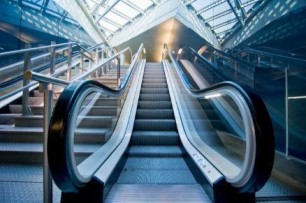
Follow these tips for a safe escalator ride
How often are we stuck behind people scared to use the escalators, or are we the ones scared of escalators? Getting on the escalator can be daunting the first few times, but once you get the hang of it, it is easy and a more convenient way to traverse different floors. If you are worried about escalator safety, this article is just for you.
We will talk about everything you need to take care of around an escalator to make it easier and safer for you. Before understanding the safety measures, let’s examine some key points concerning an escalator.
How does an escalator work?
A set of interlocking steps looped around a pair of gears is made to rotate so that each step oscillates between different building levels.
What are the different parts of an escalator?
Inlet guards: A protective guard made of rubber that fits on the handrail to avoid fingers or other parts from getting caught in the handrail opening.
Operating panel: Switches that operate the functionalities of an escalator located near the boarding and landing parts of the escalator.
Sprocket: The wheels installed at the lower and upper parts attached to the steps are known as sprockets.
Truss: The support system of the entire escalator is known as a truss.
Balustrade: The part of the escalator that goes beyond the steps, including the guards, panels, handrails, and the deck board, is known as the balustrade.
What are the common escalator hazards?
1. Contacting the moving parts:
It is imperative to ensure that all the mechanical parts are adequately covered and are inaccessible to people. Little children tend to touch or hold the moving parts, crush their fingers, or scrape the surface altogether. Remember to hold on to the railings lined with the rubber casing and leave the railing as soon as you reach the standing deck on the escalator.
Don’t use phones or being distracted while on the escalator to avoid accidents. If you are with kids, be mindful and tell them beforehand about the dangers of touching the different moving parts of the escalator. Before getting on to the escalator, check that your shoe strings are tied properly to avoid getting caught between the steps.
2. Collision:
Leave a gap of at least one step between yourself and others on the escalator. Sometimes, people can take longer to get on or off the escalator, raising the chances of a collision. Never place your shopping bags on the stairs ahead or behind you.
This can create confusion and lead to a crash. If you have a lot of bags, it is best to keep them on the same level as yours so you can easily remove the bags off the escalator before getting down.
3. Step carefully:
Before stepping onto the escalator, ensure it is moving in the same direction you want. Step carefully onto the moving band. One key rule to remember is to avoid standing in lines on the escalator. These lines separate into different steps as you move forward and might lead you to topple over to the back.
These are a few things that you need to keep in mind before boarding an escalator. If you are with kids or older adults, hold their hands so that they can keep their balance. If you see elderly people trying to get onto the escalator, offer a helping hand. Escalator accidents are familiar sights in crowded areas but being mindful of your surroundings will keep you safe.
All that said, these situations can be completely unpredictable, and it is best to safeguard yourself in these circumstances with the best personal accident insurance policy in India. Personal accident insurance is the safety net you deserve to help yourself and your loved ones cover the costs of any accidents.
Click HERE to buy the best personal accident insurance policy in India.
Disclaimer: The information provided above is for illustrative purposes only. To get more details, please refer to policy wordings and prospectus before purchasing a policy.

Here's what you should know about the insurance while scheduling a surgery
Health insurance in India covers the costs of hospitalisation, medicines, and doctor consultation fees that can arise from any illness, disease, or accident. It has become more of a necessity because of our eating habits, the lifestyle we lead, and the risks of accidents. Such insurance removes the sudden financial burden you may face due to an accident or the need for expensive surgery.
However, not all is good, even if we have insurance coverage. Here's what you should know about insurance while scheduling surgery.
1. Coverage and limit:
The cost of surgery depends on its type and complexity. While a knee-replacement surgery will cost us around 1.5-2 lakh rupees in India, a more complex surgery such as a bypass surgery can cost upwards of 5 lakh rupees. You should first consider the total insurance coverage you have, keeping in mind the type of surgery you plan to undergo.
Your insurance policy will only cover the policy amount insured. You will have to bear any additional cost incurred in the surgery over the limit prescribed by your policy. Hence, you should be financially ready and arrange the funds accordingly.
2. Waiting period:
Any insurer does not provide cover from the first day your policy starts. The insurance company prescribes a waiting period, after which they will start providing you with the coverage benefits. This waiting period is not specified by any government agency. It depends on the individual company and the illness.
For example, the waiting period for any surgery arising can range from 1-2 years. The waiting period can be as high as four years if you declare a serious pre-existing disease when purchasing the policy. The insurance company will not reimburse you for any surgery scheduled during the waiting period.
3. Surgery insurance plan:
Insurance companies nowadays provide specific "surgery insurance plans," too. You can buy such a plan in case you intend to schedule surgery in the near future. However, you should first check the list of surgeries that your policy will cover.
Next, make sure your sum insured is adequate to cover all the costs related to the surgery. This includes the cost of surgery, hospitalisation, medicines, doctor fees, etc. You should also confirm the waiting period and the exclusions under your policy and assure yourself that your surgery will be covered under it.
4. Cashless claim:
A cashless hospitalisation facility settles your hospital bill without having to pay any cash at the time of discharge. Insurance companies tie up with hospitals and directly settle your bill with the concerned hospital.
Whenever you plan to schedule surgery, make sure the hospital you choose is one of the network hospitals of the insurance company. You can enjoy a cashless treatment facility there. You will not have to worry about paying the hefty bills and getting them reimbursed by your insurance service provider later.
Health insurance in India is extremely helpful when planning a necessary and expensive surgery. It removes the stress of arranging immediate finance for the surgery when you are already reeling under the stress of getting it done.
You should always go for the best health insurance in India available in the market. Its terms and conditions regarding the coverage and payout must be clear. The insurance policy should act like your saviour in difficult times. It should not be an additional burden on you when filing the claim during surgery is delayed or difficult. Also, it should be economical to fade away your financial stress.
Click HERE to buy the best health insurance in India policy to keep you and your family safe from health adversities.
Disclaimer: The information provided above is for illustrative purposes only. To get more details, please refer to policy wordings and prospectus before purchasing a policy.

Are you a flashpacker? Follow these tips to make your flashpacking trips memorable
India is a diverse nation with many beautiful surroundings, sceneries, and landscapes. Due to this spellbinding canvas of experiences, it has a flourishing tourism industry to make every occasion come alive. People from far and wide visit India to witness its monuments, lakes, forts, palaces, mountains, valleys, and cultural bliss.
Many terms are going the rounds for Gen Zs and Millennials who have a zest for travelling in and around India. The words like backpacking and flashpacking are thrown around like confetti. But what exactly do they mean? More and more travellers are turning towards flashpacking with time. If you're also one of them, this article is for you.
Amidst all this, you must have personal accident insurance India to help you stay secure and safe when you travel to explore new destinations and discover rare experiences.
What is flashpacking?
Flashpacking is one of the most travel-related terms in fashion and making the news right now. You may be familiar with backpacking which deals with travelling to far and wide places on a budget. It is usually done solo to explore more areas of the country. Backpackers mostly stay at hostels and enjoy the local street food. Everything is done keeping a tight budget in mind.
On the other hand, flashpacking is described as backpacking on a better budget. It refers to solo or independent travellers with more money to spare on their travels. Unlike backpackers, this expenditure is spent on the best food chains and boutique hotels. They want to explore every nook and corner of the country with added luxury and comfort.
What are the pros of flashpacking in India?
There are a variety of advantages of flashpacking in India. Since you will not have a tight budget to adhere to, you can enjoy it to the fullest. Some of the widely known advantages are:
● You can stay at the best, most comfortable, and luxurious hotels that offer magnificent views. For instance, if you're in Udaipur, you can book a hotel overlooking Lake Pichola.
● You will get a peaceful sleep in your comfortable bed. You will not share a room or stay in the dormitory, which can disrupt your sleep and cause other distractions while you try to enjoy your solitude.
● Since you'll be exploring the best food joints in the place, you'll never sleep on an empty stomach. Further, the options are deemed to be delicious as there is no shortage of funds.
● You can also travel comfortably in cabs or motorbikes without having to hitchhike or wait for your next ride.
Tips to make flashpacking trips memorable:
There are many tips and tricks that you can consider while flashpacking as an independent tourist in India. These are:
● Make sure you research and plan before embarking on your flashpacking trip to India. You can consult a travel agent or company that has enough resources for the same.
● Book your flight or train tickets in advance to avoid problems later.
● Do not force too many places in a single day. With no budget limitation, you can prolong your trip as long as you want without any worries.
● Ensure that you have enough information about the entry time, fees, and mode of travel for a particular place you want to go to.
● Carry all the essentials like medications, sunscreen, masks, sanitiser, snacks, and so on.
● Book the best hotels with a view well in advance, so you do not have to worry about having a luxurious stay.
● Choose the best and most well-researched places to stay in the city.
You should consider many things before you plan a flashpacking trip in India. You should take all the necessary precautions and also have personal accident insurance India to cover the medical expenses in case of emergency. India welcomes several once-in-a-lifetime experiences and moments you can cherish by setting out on tours to the country's diverse retreats.
Click HERE to buy personal accident insurance India.
Disclaimer: The information provided above is for illustrative purposes only. To get more details, please refer to policy wordings and prospectus before purchasing a policy.

Effective tips to avoid panic if your bike breaks down far from home
Your bike is probably your favourite asset. Everything from grocery runs to those weekend trips; your bike is always at your beck and call. But what if someday, your bike breaks down in the middle of nowhere? What will you do? Your bike could break down for various reasons such as your battery dying, punctured tyre, malfunctioning brakes, etc.
A vehicle breakdown can be one of the most panic-inducing situations, and keeping your mind together to find a solution becomes challenging. Not only does it leave you stranded, but it also compromises your safety and makes you more susceptible to mugging and robbery.
Let's discuss a few things you need to do in case of a bike breakdown and how to avoid panic and confusion.
1. Move to a safe location:
Your vehicle generally gives you signs of breakdown way before it happens. Driving towards a safe spot is best if you feel like your bike might give up soon. Bus stops, supermarkets, and petrol pumps are some examples of safe spots that you can opt for. If your vehicle has already died out on you, you might have to push the vehicle further.
The main idea behind locating a safe location is to ensure your safety. You have to stay away from traffic to avoid a collision. You can also call your mechanic or service provider for immediate assistance once you are away from the road.
2. Secure the bike:
After reaching a safe spot, shut the engine off. If you can understand the issue, you can take the necessary action. However, if you don't know the problem, keeping a safe distance from your bike is best. However, stay close enough to have a clear view of the bike. Remember to keep your RC, driving licence, and all the other essential documents handy with you at all times.
3. Stay visible:
It is best to keep yourself visible to other pedestrians and commuters if a breakdown happens at night. Use blinkers or hazard lights. Whenever riding at night, it is best to wear high-visibility jackets. Use anything readily available around you, such as signs or cloth, to use as flags or signals for others.
4. Tools and repairs:
A repair kit comes extremely handy in case of a tyre puncture, dead battery, or failed brake system. Learn to use tools so that you can fix the basic issues that your bike might be facing. Fixing a tyre, jumpstarting a bike in case of a dead battery, etc., are skills that will be helpful in situations like these.
5. Invest in two-wheeler insurance:
The breakdown is one of the situations that help us understand the true value of insurance policies. Before embarking on trips, ensure to buy two wheeler insurance online India and regularly keep it up-to-date. Look for options that give you roadside assistance.
Under this cover, your insurance provider is bound to bring help to you wherever you are and help with the repair and movement of the vehicle from the site to the service centre. Getting roadside assistance strengthens your overall insurance policy and safeguards you against situations like these.
These were a list of all things you need to do if your bike breaks down in the middle of a road. As mentioned, it is imperative to keep yourself away from traffic and call for help as soon as possible. Talk to your insurance provider to understand the next steps that need to be taken and ensure the validity of your two wheeler insurance online India. With these things in mind, you can avoid panic and keep yourself and your bike safe.
Click HERE to buy two wheeler insurance online India.
Disclaimer: The information provided above is for illustrative purposes only. To get more details, please refer to policy wordings and prospectus before purchasing a policy.
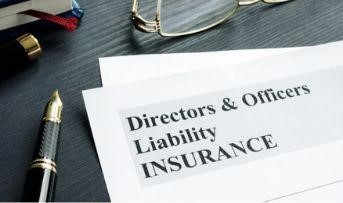
Complete guide on Directors and Officers liability insurance
Directors and officers of a company are vulnerable to being sued by several disgruntled entities, such as shareholders, employees, vendors, creditors, investors, etc., due to wrongful acts or misdeeds while managing the company. Directors and Officers (D & O) liability insurance protect against such lawsuits. The legal environment is complex, and such insurance helps to cover the high cost of lawsuits.
The policy protects the personal assets of the Directors and their spouses. It also protects the company by covering the legal fees, settlement costs, and any other costs that the company might incur while defending the lawsuit.
Reason for suing:
The directors and officers can be sued for several reasons while performing their company duties. Some of the common reasons are:
● Misuse of company assets and funds
● Misrepresentation
● Financial loss to a stakeholder due to a breach of fiduciary duty
● Errors in reporting
● Violation or theft of Intellectual Property Rights
● Lack of corporate governance
● Poaching of customers/ employees of the competitor
What acts are not covered under the policy?
Such policies generally do not cover acts of fraud, criminal activities, and illegal profits made by the directors and officers while performing their duty and acting on behalf of the company.
The process:
An unhappy person or company may decide to sue the director or officer of the company in court if they fail to perform their duty. This will generally happen when someone suffers losses due to their conduct or action.
The company's manager and legal/ risk department will be informed of the case, which they will forward to the insurer. The insurer will cover the claim if it meets all the terms and conditions of coverage. The defence costs, as well as the financial losses, will also be covered if they lose the case.
Exceptions:
The insurer will deny settling the claim if the company does not disclose material information or provides inaccurate facts.
Most of such policies contain a clause known as 'insured vs. insured exclusion'. Under this clause, the insurer will not settle a claim if the directors and officers sue the company. This ensures that the company cannot profit from deceit or conspiracy.
Coverage:
A Directors and Officers liability insurance policy protects the personal assets of the directors and officers in case a stakeholder or a third party sues them. Their company may not be in a position to indemnify them if the claim amount is big and it does not have the required resources. In such a situation, the insurer will pay the litigation costs and protect the personal assets of those involved.
The insurer will reimburse the company for the legal costs if it has already granted indemnification to its director or officer. Such a policy provides coverage to the company, too, in case it is sued.
These policies usually cover the company's present, past, and future directors, managers, and officers.
The dilemmas:
This is a typical type of insurance coverage and generally comes with a long list of terms and conditions. Hence, it brings with it a lot of questions and dilemmas for the buyer. The company has to decide how much should be on the cover, what deeds of its employees are included under the cover and what is excluded, whether it is a good option for a Small-to-medium sized company (SME), etc.
A Directors and Officers liability insurance policy has become very common with big multinationals in India. Every sector is opening up to such policies- public, private, or not-for-profit. This is why public liability insurance India is gaining importance. Policies are being tailored for small and medium enterprises as well because of their huge number in India.
The cost of litigation is very high, and one court case can cripple an organisation's financial resources. However, the penetration is still low at present, and a huge potential exists in this sector.
Click HERE to buy public liability insurance India.
Disclaimer: The information provided above is for illustrative purposes only. To get more details, please refer to policy wordings and prospectus before purchasing a policy.

Here are ten interesting facts about cars that will amaze you
Have you ever wondered what an astounding invention your automobile is? How smoothly it moves across the roads and takes a U-turn with grace is truly mesmerising. Let’s unravel some interesting facts about cars that you might have heard or might be learning for the first time.
1. Do you know about 1 billion cars are plying on the roads currently? This number is only expected to double in the next 20 years, with the increasing usage of vehicles on the street. That means, if you get out of your house at any given point of the day, you are sure to spot at least 100 cars in 10 minutes hurtling down the roads going on with their busy days.
2. Have you seen those old cartoons where a car runs upside down at unbelievable speeds? Well, it’s not unbelievable anymore! This reality has been achieved by supercars and Formula 1 cars with modern technology. Theoretically, a formula 1 car could easily be driven upside down at high speeds.
While experimenting with this remarkable phenomenon, the critical calculation is the optimum speed required to produce enough traction with the road surface, so you don’t fall off due to gravity. You might have to maintain a speed of 130 miles per hour, or you could go right back down!
3. Most people have a fear of travelling by planes. The dire news flashes about the various plane crashes and the massive casualties do not help. But it’s shocking to note that the probability of getting killed in a plane crash is much lower than in a car accident. The odds of dying in a plane crash is 1 in 11 million, which is ludicrous compared to the 1 in 5000 in car crashes.
4. Do you sometimes imagine being an astronaut, going on the moon, and spacewalking to your heart’s desire? It is a far-fetched dream for most, but an interesting fact is that if you could ignore all the rules of physics for a month and drive a reasonable 100 km per hour, you would cover the distance to the moon in your sweet ride.
5. For those who have a hard time staying under the speed limit and crave a little thrill while driving, the first speeding ticket was issued in 1902 to a person driving at a scandalous speed of 70 km per hour.
6. A heartwarming fact for nature activists is that nearly 80 per cent of an average car is recyclable. This means that there is significantly less plastic waste generated by the automobile industry, as automotive recycling is one of the biggest industries in the world at the moment.
7. It seems ridiculous that people once used to have horse carriages instead of cars. What is even more interesting to note, however, is the fact that cars have evolved from horse carriages. For instance, a dashboard in the olden times would prevent the driver from getting muddy by the horse’s trotting!
8. Ethanol, used as car fuel, is made directly from sugarcane.
9. How often have you been frustrated about your car breaking down in the middle of the road? It seems almost understandable when you know that a car has nearly 30000 unique parts! It’s a miracle it doesn’t break down more often. So, it is undoubtedly best to research and buy car insurance online to stay stress-free about your vehicle.
10. A woman by the name of Mary Anderson invented the windshield wipers in 1902 and was soon granted a patent.
For many, the car is simply a means of commuting. But for car enthusiasts, their car means much more and is nothing less than a family member. But with the constant hustle and bustle of city life, it becomes tough to maintain your car as it’s supposed to. Regular servicing and maintenance are required to keep your car in the best shape.
Insurance is the best way to manage your finances efficiently, from ensuring the fitness of each mechanical part to the overall appeal of the car. Switch to digital transactions and buy car insurance online to avoid a hole in your wallet due to these expenses. You just need to regularly check your insurance policy and keep it up-to-date to prevent the policy from getting terminated.
Click HERE to buy car insurance online.
Disclaimer: The information provided above is for illustrative purposes only. To get more details, please refer to policy wordings and prospectus before purchasing a policy.
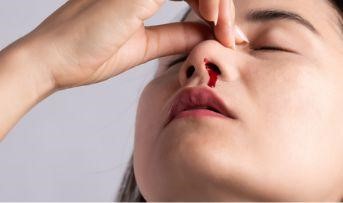
Here are the ways you can identify a broken nose and perform aftercare
With a significant emphasis on laborious work that yields marginal returns, there is no alternative to physical effort. As the intense nature of work causes accidents routinely, and the risk of mishaps continues, making personal accident insurance India is a necessary investment.
One of our body’s most overlooked and fragile parts is the nose. It directly impacts the facial structure and looks of a person. It is a very delicate structure made of two bones that can snap for multiple reasons, resulting in a broken nose. Identifying a broken nose is crucial at the earliest to providing proper medical attention and effectively performing aftercare.
Read on to learn about identifying a fractured nose, precautions, and best aftercare tips!
Causes for a broken nose:
It is essential to know its formation to understand the causes of a fractured nose. The two bones in your nose are located at the bridge where your sunglasses rest. They make the base of the structure and space for cartilage. Technically, the cartilage cannot break since it is flexible, which implies that a broken nose refers to a fractured nose bridge.
A broken nose bridge can be a result of various factors, including but not limited to the following:
● Sport injuries
● Automobile accidents
● Physical violence
● Slamming the face into inflexible objects
● Falling face first
Signs of a nasal fracture:
The nose has a significant impact on the look of your face. Therefore, a broken nose is quite easily identifiable. However, here are some signs that determine if your nose is broken:
● Shooting pain from the nose
● Bruising at the nose and under the eyes
● Slight crookedness of the nose when compared to its regular structure
● Sudden nosebleeds and mucus discharge
● Difficulty in breathing from either or both nostrils
It is best to get your nose checked, even if you do not notice any visible signs.
Can it be treated at home?
It is recommended to rush to the hospital to address the injury immediately. Waiting for the bleeding or discomfort to stop further complicates the issue. Do not consider solving the problem at home. Seek a medical professional’s attention immediately. Usually, personal accident insurance India covers the medical costs of the injury.
Medical procedure:
Depending on the severity of the issue, you may have to undergo a CT scan or an X-ray. A hairline fracture can be treated using some ice and painkillers. You may require surgery to realign the bones and antibiotics for severe issues. At the most, it should take two to three weeks for your nose to heal.
Aftercare:
Once the medical professionals have assessed the situation and taken appropriate steps to stop the pain, bleeding, or discomfort, it is vital to follow proper steps to make the treatment effective and heal your nose.
● Icing is recommended to soothe the pain, especially immediately after the injury. A cold compress using ice wrapped up in cloth is the easiest way to tend to the pain.
● If prescribed, make use of painkillers. However, do not act without the doctor’s approval and ask for medicines instead of self-diagnosing painkillers.
● Keep your head tilted up as much as possible. Avoid pressure on the nose caused by sleeping sideways or on your stomach.
● Avoid strenuous activities that can break your nose again until your nose heals.
A broken nose can be a painful accident to deal with. While there are no ways to prevent accidents, buying personal accident insurance India can help reduce the burden on you. Avoid distractions while doing a task that requires more focus. Be cautious always and prioritise your safety.
Click HERE to purchase reliable personal accident insurance India.
Disclaimer: The information provided above is for illustrative purposes only. To get more details, please refer to policy wordings and prospectus before purchasing a policy.
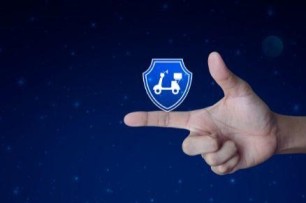
How can you obtain a duplicate two-wheeler insurance in case you lost your original
Your insurance for a two-wheeler is an essential document without which you should not risk travelling. The Motor Vehicle Act mandates the importance of carrying your insurance papers. These documents provide information about the rider, including your two-wheeler's registration number and your purchased insurance policy.
The policy documents contain all the essential information required to identify your vehicle, its legality status, the rider's identity, the dealership, your insurance provider, and much more. This information portrays the rider as a responsible citizen who would abide by the safety protocols on the road and, therefore, can be entrusted to drive around without causing any trouble.
There is always a possibility for human error. In this case, what if you end up losing your insurance policy documents? So, how do you solve this problem, and how can you obtain a duplicate 2 wheeler insurance if you lost your original? This blog will answer all your questions and provide you with better information so that you can stay informed and know what to do in case you end up in a similar situation.
1. Lodge a complaint:
For a policy which is bought offline, your first step in obtaining a duplicate two-wheeler insurance will be to file a complaint. Visit your nearest police station and ask them to file an FIR about your missing insurance documents.
You will need to give them essential information like your policy number, your insurance provider, description of the vehicle, the type of policy, details about add-on coverage options if you opted for any, and your personal information like name, job role, contact number, etc. This document will then be verified and attested saying that you lost your insurance and will be sent to your insurance provider claiming the same.
2. Apply for the duplicate insurance documents:
Now that you have a copy of the registered FIR supporting the loss of your insurance documents, you need to apply for a duplicate copy of your 2 wheeler insurance. You will be required to draft an application letter claiming your missing insurance documents and how you would like to request a duplicate set of the documents for future purposes.
Make sure you attach the FIR and your application to support your case. If your insurance policy is a joint one, both policyholders must sign the letter, which will be submitted to your insurance company.
3. For the formal request:
You must sign an indemnity bond stating that you would like to make a formal request to get a duplicate set of your insurance documents. The indemnity bond is to be signed on a non-judicial stamp paper.
Details like your name, the joint policyholder's name (in case of a joint policy), policy number, etc., are mentioned on the indemnity bond. Apart from this process, the bond requires signatures from two witnesses who should not be a part of your family. The insurance company might ask you for proof of your financial standing.
4. Newspaper advertisement:
Another step you can include (if required) in this process is publishing an advertisement in the newspapers mentioning the loss of your documents, the insurance provider's name, and other required details for identification. Make sure to submit the copy of advertisement to your insurance company. Submit all the supporting documents mentioned above, and the organisation will give you a duplicate set of your insurance documents after their verification process.
Obtain your car insurance copy online:
As against the tedious offline method, you can also get your duplicate car insurance policy online by sitting at home. This is possible only if the policy is bought online. To get this;
• Visit the website of your car insurance provider
• Login to your account by putting your account details, policy number, name, age, phone number, etc.
• Go to the policy download option
• You will receive the policy document through email to your registered email address
• Download the car insurance policy document and keep the digital or printed copy along with your other car documents.
Protecting your vehicles with a reliable insurance policy is paramount for their safety. Mishaps can sometimes severely impact your two-wheeler. Getting the best 2 wheeler insurance that suits your needs will help you stay stress-free regarding your financial worries in such emergencies. Your insurance provider will undertake the expenses required for your two-wheeler's repair and maintenance work.
Click HERE to know more about the benefits of 2 wheeler insurance.
Disclaimer: The information provided above is for illustrative purposes only. To get more details, please refer to policy wordings and prospectus before purchasing a policy.
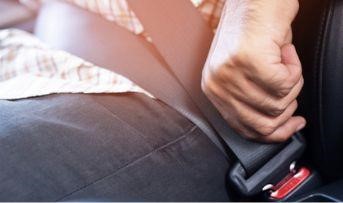
Do the motor insurance policies cover the damage to passengers not wearing seatbelts
Drivers and front-seat passengers must wear a seatbelt when the vehicle is running according to the Central Motor Vehicles Rules (CMVR). Not complying with this rule can lead to a fine of 1000 INR. Surpassing the fine should not be the motive for wearing a seatbelt. Other than the fine, it can be a big life saviour in times of an accident. There is also a rule that the passengers in the rear seat should wear a seatbelt. But, as per the reports, most passengers avoid wearing a seatbelt in a running car.
It is crucial to understand that it just takes a few seconds to buckle the seat belt, which can protect you and your passengers from severe bodily damage in case of an accident. Also, as per a poll, wearing a seatbelt by a co-passenger had shown a reduced risk of being heavily injured or killed by 25% and 75%, respectively. Not just this, did you know that your motor insurance company can reject your claim if it finds that you weren’t wearing a seat belt at the time of the accident?
Let us go through the details of the coverage of damages under motor insurance policies to passengers not wearing seatbelt.
1. Not wearing a seatbelt:
Technically speaking, if you are driving without wearing a seatbelt and you meet with an accident, the insurance company should not be liable to pay for any damages. One can argue that the person could have been saved or suffered much lesser damages during the accident if he had been wearing the seatbelt.
2. Lower compensation:
The main motive of all insurance companies is to make profits. Hence, if they find out that either the front-seat passenger or even the rear-seat passenger was not wearing a seatbelt, they may approach insurance tribunals and file a contributory negligence plea against the insured to lower the compensation or reject it fully.
The courts or the tribunal can lower the compensation claim to some extent. The claim is not rejected just because the insured was not wearing a seatbelt during the mishap. However, lowering the claims is possible since it is a form of non-compliance.
3. Personal accident cover:
Under the motor vehicle act, an individual must take a personal accident cover along with vehicle insurance. It also applies to third-party insurance. Even if the passenger is not wearing a seatbelt, the personal accident cover will pay for the compensation in case of death, injury, or permanent disability due to the accident.
By buying a passenger add-on cover, you can buy similar coverage for up to three co-passengers sitting in your car. This will cost you some extra premium but will provide effective cover to all the passengers in the vehicle.
Driving your vehicle without wearing the seatbelt puts a lot of lives in danger, be it you, your co-passengers, or the vehicle or person with which you have met with the accident. Passengers in the front seat and the rear seat must follow the rule of wearing seatbelts and save penalties and lives.
This is why even the Government of India has announced that it will soon be mandatory for passengers sitting in the back seat to wear the seatbelt when the vehicle is in motion. Even the motor insurance company cannot reduce your insurance claims if you start following this.
There are no shortcuts to safety, and negligence can cost you not just money but even life! Press the accelerator only when your seatbelts are on, drive under the speed limit, follow traffic rules, avoid lane cutting, and make optimum use of all safety equipment installed in your car.
Click HERE to buy insurance from the best motor insurance company.
Disclaimer: The information provided above is for illustrative purposes only. To get more details, please refer to policy wordings and prospectus before purchasing a policy.
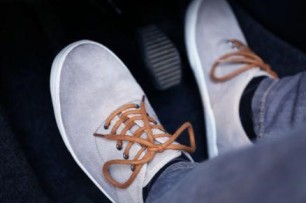
Here are the easy and effective ways to master clutch control of a car
Mastering the clutch can be challenging for somebody who has just started learning to drive a car. When to press the clutch, when to let go, and what to do on a slope are only some of the many clutch-related questions we face every day as a beginner. But as somebody rightfully said, practice makes it perfect.
The more you practice, the better you handle the accelerator and learn to sync with the vehicle's clutch. However, you can do a few things to improve your driving experience and better understand your car's clutch system.
This article will look at all the simple tips and tricks you can follow to master the clutch and become an expert driver in no time.
1. Adjust your driving environment:
When practising your driving skills, it is essential to ensure the safety of yourself and others. Choose an empty field or road to practice your driving manoeuvres. Ensure that nobody is around you and your car for a considerable distance.
Wear your seat belt tightly and adjust your seat to get a comfortable driving posture. Your seat adjustment is key to good driving. If you have to strain your legs to reach the pedals or if you have to cramp your legs into position, then it will affect your driving adversely.
2. When you start the engine:
One of the main issues faced by new learners is starting the car. It is natural for the car to sputter or jerk when starting as a beginner. Talk to an instructor and learn how to manoeuvre the clutch and the accelerator. Once you turn on the ignition, depress the clutch fully and put your car in the first gear.
Now, slowly release the clutch and accelerate the pedals. A rule of thumb is that the accelerator and clutch are complimentary pedals. The more stress you put on the clutch, the lesser power you give to the accelerator. Repeat this step for few times to get a command over bite point of clutch.
3. Manoeuvring the slopes and hills:
One of the new drivers' biggest fears is taking the car up a hill. While it might seem like an intimidating task, with practice, you can master conquering any hill. While climbing a steep slope ridden with traffic, you must keep two things in mind. First, your car needs maximum energy to climb the hill.
Second, you cannot accelerate the car because you always risk crashing into another vehicle. In a situation like this, you must constantly alternate between controlling the clutch and handling the speed. Dip the clutch constantly to keep the car moving slowly, but if you feel like your vehicle is going to stop and recede, raise the pedal to give it some speed.
4. Conquer the fear:
While this is seemingly obvious, most people quit driving because of fear. Improper clutch handling brings the fear of accidents due to wrong coordination. It may also result in quicker wear and tear and might need replacement before time. But if you are covered by good car insurance, you can rest assured that all the expenses will be taken care of by your insurance provider.
Give yourself and your car as much time as needed to understand the vehicle's functionalities better. Most importantly, do not compare your learning speed with others because what matters is that you are keeping yourself and others on the road safe.
These are a list of a few things that you need to remember when handling clutch. As mentioned above, insure cars with affordable yet efficient insurance companies. With the new car insurance rates in the market, there are many options to choose from.
Click HERE to know new car insurance rates in India.
Disclaimer: The information provided above is for illustrative purposes only. To get more details, please refer to policy wordings and prospectus before purchasing a policy.

Here are the side effects of taking excessive painkillers
Sometimes you suffer a severe headache and feel like someone is whacking you in the head with a hammer. You, therefore, take a few painkiller medicines, and the pain quickly passes! That is the magic of pain relievers. They alleviate the discomfort so you can get on with your day.
Painkillers do come with a fair share of hazards and can have detrimental consequences on your body, especially when taken frequently. This post will review how painkillers go through the potential long-term impacts they may have on the body.
Effects of chronic painkiller abuse on the body:
You inhibit your body from naturally reducing pain when you use a painkiller medicine longer or more frequently than is recommended. By tricking your brain into believing it needs the painkiller to feel good, these medications cause your body to produce fewer "feel good" chemicals and endorphins.
The central nervous system suffers significantly from this frequent use of analgesics. As we've already said, some painkillers slow down the central nervous system to help block pain. However, too much of them can make it hard to breathe, slow down your body's reactions, and make you slur your words.
Painkillers have effects beyond how they affect your body's natural pain-relieving systems and central nervous system. Abuse and dependence on painkillers can have repercussions throughout your entire body, such as
1. Your liver:
Your liver processes and breaks down the medications you consume. When you misuse painkillers, your liver retains the poisons from these drugs, which can cause severe and fatal liver damage.
2. Your heart:
To experience painkiller effects right away, some people crush or inject the drugs directly into their bodies. But doing so results in the medicine going straight into the bloodstream, which impacts the heart. Abusing painkillers over a long period can result in major cardiovascular problems and risks of heart attacks.
3. Your stomach:
Even after taking painkillers for a day or two, stomach and intestinal problems can still develop. Abuse of painkillers can cause haemorrhoids, intestinal blockages, bloating, abdominal distention, and constipation.
4. Your veins:
Injecting painkillers for an extended period is fatal, especially if the needles are shared or not sanitised. Blood-borne infections, illnesses, and blocked veins can result from injecting painkillers drugs.
Once a person becomes dependent on a painkiller, there is no way to stop without going through withdrawal. Even though withdrawal symptoms don't last forever, they can include nausea, vomiting, trouble sleeping, aches and pains, irritability, and anxiety. If you or a loved one is suffering from a painkiller addiction, seeking immediate treatment is crucial because it's typical for people to overdose when attempting to relieve withdrawal symptoms.
How can you take painkillers more effectively?
• Before taking any painkillers, if possible, speak with a doctor
• Avoid taking painkillers for more than a few days straight
• To limit the risk of problems and side effects, start a new drug at the lowest dose possible
• Take the drug only as prescribed, never more. You can visit a doctor for the maximum dose or look it up in the drug information booklet
• Avoid giving others access to your painkillers
• Consult your doctor rather than taking more painkillers if the pain persists or gets worse after taking them
Most over-the-counter medicines are safe for treating mild to moderate pain. But these can also have negative side effects, some of which could be fatal, just like any medication. People who often use painkillers should speak with their doctor to ensure proper treatment and avoid any negative consequences.
With rising healthcare costs, access to high-quality medical care may become prohibitively expensive. Every citizen must sign up for a good health insurance plan in case they or someone they love gets a disease that could be financially devastating. Each insurance plan has a policy duration, and you can buy health insurance online. So, depending on the insurance company, your plan is valid for a particular period.
Click HERE to buy health insurance online.
Disclaimer: The information provided above is for illustrative purposes only. To get more details, please refer to policy wordings and prospectus before purchasing a policy.

Here are the health benefits of swimming that you must know
With stressful routines making their way into personal and professional lives, more and more people are turning towards a healthy and happy lifestyle. The first step towards a healthier lifestyle begins with a small step today. Exercising along with healthy eating habits contributes towards a better tomorrow. It helps rejuvenate the mind, body, and soul and improves well-being.
With the changing environmental factors, it is essential to maintain good immunity and metabolism. Many physical activities help stimulate the body's response. These activities include jogging, running, swimming, and so on.
Swimming is one of the best fitness regimes to help you stay in the best shape and enhance your stamina. Before taking up any physical activity or sport, ensure that you grasp thorough knowledge about that particular activity. Understand the do's and don'ts and ensure that you follow all safety measures. Consider personal accident insurance online to get coverage for medical expenses if you meet with an unfortunate incident.
Let's look at the health benefits of choosing swimming as your hobby.
What are the health benefits of swimming?
Swimming has a myriad of health benefits that contribute to the effective functioning of the body. The health benefits can be classified as follows:
1. It cuts the risk of cardiovascular diseases:
It is a proven fact that swimming can contribute to heart’s health. It helps in the proper functioning of your heart muscles and reduces the risk of developing cardiovascular diseases.
2. It is good for bones:
Bone density is important in keeping your body fit from the core. Swimming can reduce the risk of developing arthritis by strengthening joints and providing the best nourishment to the bones.
3. It burns calories:
Swimming is extremely effective in burning calories as it involves rapid and continuous motion of different muscles and the coordination of several body functions simultaneously. It enhances the flexibility of the body as well.
4. It develops a healthy respiratory system:
Swimming involves a lot of breathing: both deep and normal breathing. Deep breathing enhances the respiratory system, and the lungs are trained to draw more air and increase the blood oxygen level.
5. It is therapeutic:
Swimming is a good stress buster that helps deal with anxiety and uplifts your mood. It is an effective tool for coping with depression and anxiety.
6. It stimulates blood circulation: It is supposed to be one of the effective tools to boost blood circulation in the body. It is a great way to work out without sweating.
7. It makes you feel younger:
Swimming helps your mind and body stay energetic. It also contributes to making your body look young and agile. It is believed that swimming can delay your ageing process.
8. It is great for asthma:
Quick swimming lessons can help people with asthma as the intensive regulation of breathing can increase the endurance capacity of the lungs.
9. It provides a full-body workout:
Swimming is one of the many exercises that involve your whole body. It helps in the movement of all the muscles and stimulates them evenly. Every swimming style stimulates a different muscle. So, daily a 45 mins session can be equivalent to a full-body workout.
Swimming is one of the most effective and easier ways to stay physically active. Once you start, there is no going back. You feel more relaxed when you swim. There are many ways to develop your swimming habit. You can join a community pool or enrol in a swimming camp. For kids, it is extremely easy to find a school or institute that teaches swimming.
Amidst all this, it is necessary to keep yourself secure at all times. Hence, purchase personal accident insurance online to provide financial cover to compensate for the loss in case of accidents while swimming.
Click HERE to buy personal accident insurance online.
Disclaimer: The information provided above is for illustrative purposes only. To get more details, please refer to policy wordings and prospectus before purchasing a policy.

Here is the list of the top race tracks for biking enthusiasts
If racing fantasies you and if you consider yourself a biking enthusiast, we’ve got you. We all have been fascinated by high-speed car and bike chases and races in our lives. Be it watching Formula One racing or watching movies about speed, they blow our minds with all the stunts, the cinematography, the angles, the acting, sound effects, visuals, and most importantly, “the adrenaline rush” these sequences provide us.
But does India support such racing events? Are there any such riding competitions held in our country? Do you have such questions and require more information on this subject? Well, this blog will have answers which will pique your interest in this topic. Here is the list of the top race tracks for biking enthusiasts.
1. Buddh International Circuit:
Constructed in Greater Noida, Buddh International Circuit made it to the national and international headlines as India’s official Formula One circuit. India is one of the few countries with a racetrack for large-scale international events. The Buddh International Circuit also hosted the Indian Grand Prix for a couple of years, making India one of the few countries to pull it off.
And not just Formula One, this circuit has hosted several competitions such as the National Racing Series, the F1600, the T1 Truck Racing Series, and the National Motorcycle one-make series, to name a few.
2. Madras Motor Racetrack:
This racing track is situated in Irungattukottai, Chennai, India’s first official circuit. It was constructed around the 1980s and was finally set in motion for its purpose in 1990. It has seven turns in its short club track, while the track consists of twelve turns altogether. The short club track has a length of 2.1 km, and the entire circuit is designed in a clockwise pattern.
The racetrack acquired its grade two licence to host multiple bike and car races in several categories, including GT and touring car racing. It staged several other races except for Formula One. The Madras Motor Race Track has also hosted National Touring Cars, the National Motorcycle, and the one-make Motorcycle Championship, to name a few other races. The racetrack is considered to be fit for off-road Supercross competitions too.
The other purpose this racetrack serves is for bike, and car manufacturers, as several of them test their vehicles on this track to check the quality and other features and whether their product requires rework or is fit to be rolled out to the public.
Various automobile-related newspapers, magazines, and websites use these tracks to understand different vehicles better before publishing content about them for their enthusiastic audiences.
3. Kari Motor Speedway:
The racetrack called Kari Motor Speedway is located in Coimbatore, Tamil Nadu. This track was opened in 2013 and has been named after racer and designer Late Mr. Sundaram Karivardhan.
In the past, this track acted as a runway for power gliders and was a part of the Karivardhan-owned aviation company. The Kari Motor Speedway has hosted events like National Touring cars, one-make series, and the National Motorcycle Championship, to name a few.
Some other race tracks in India are Chicane Circuit, Hyderabad, Meco Kartopia in Bangalore, etc., which host various karting competitions.
We hope this helped you gain insights into how our country promotes such racing events and has avenues for the same. And in hindsight, while we cater to the biking fanatic in you, we would also like to draw your attention to the safety of your vehicle. To combat the unexpected situations and focus on getting your two-wheeler fixed, you need to purchase 2 wheeler insurance. Explore all the options provided by various insurance companies and buy the best 2 wheeler insurance which would serve your needs optimally.
Click HERE to know more about the benefits of 2 wheeler insurance.
Disclaimer: The information provided above is for illustrative purposes only. To get more details, please refer to policy wordings and prospectus before purchasing a policy.

Here are the benefits of drinking water in a copper vessel
The emphasis on health and preventive care has skyrocketed post-pandemic. People of different ages leading varied lifestyles have stepped up and are paying attention to their exercise, sleep, and diet to stay healthy. However, these measures are difficult to continue for undisciplined people or those with extremely hectic schedules.
For such people, it is best to adopt small measures that aid in the long run and only require spending less time on fulfilment. Such measures, supplemented with purchasing the best health insurance in India, are plenty to keep oneself stress-free about their health without stressing too much.
With India being the land of Ayurveda, what better way to enhance your health than following small health tips daily? One of the most strongly recommended activities is drinking water stored in copper vessels. Why? What are its potential benefits?
Read on to find a comprehensive list of benefits of drinking water in a copper vessel.
1. Promotes hydration:
Hydration is an essential part of a healthy lifestyle. Negligence can lead to severe complications in the long run. To drink water from a copper vessel, one must consciously store water overnight to gain its most benefits. This way, you can ensure that you are keeping track of your water intake and preventing future medical complications.
2. Prevents copper deficiency:
Copper is a mineral required by our body to function at its optimum capacity. Naturally, humans can only produce up to 1.4 to 2.1 mg of copper per kilogram of body weight. It is essential in red blood cell production, maintaining nerve cell health, and boosting the immune system.
Water stored in copper vessels carries the properties of the mineral, thereby preventing its deficiency. However, excess copper exposure may lead to poisoning and other illnesses. So be mindful of the intake.
3. Aids in battling cancer:
While it alone cannot ward off or eliminate cancer, it aids in eradicating cancer by acting as an antioxidant. It fights cancer-causing free radicals and even helps produce melanin, which protects the skin from harmful UV rays.
4. Improves thyroid functioning:
Water from copper vessels possesses the quality of balancing the improper functioning of the thyroid gland. If you suffer from copper deficiency, you may be suggested this as a measure to improve your thyroid gland's functioning. This can directly impact your metabolism and growth.
5. Helps with inflamed joints:
The copper produced in the body is stored mainly in the skeletal structure. If you suffer from weak or inflamed joints or arthritis, consider drinking copper-infused water to strengthen your skeletal system.
6. Antimicrobial properties:
Copper has significant antimicrobial properties, which can help prevent diseases by eliminating bacteria, viruses, or fungi that may have entered your body and compromised your immunity.
Since it has natural preventive benefits, it is highly recommended for seniors with weaker immune systems and joint pains. You must also look for the best health insurance in India for your aged parents and immediate family to protect them with a reliable safety net.
With many more benefits, it is highly recommended that people with copper deficiencies drink water from copper vessels. They make for better, cold, and sweet-tasting water, which is much better than water from packed bottles. Try such non-invasive, easy-to-follow tips that Ayurveda suggests, along with the best health insurance in India. Your honest efforts will help you reap the desired results in achieving a healthy lifestyle.
Click HERE to buy health insurance in India.
Disclaimer: The information provided above is for illustrative purposes only. To get more details, please refer to policy wordings and prospectus before purchasing a policy.

How can acidity lead to bigger health issues
Ever felt discomfort in your gut followed by a burning sensation in your chest? This could be because of acidity. Very often, people neglect the symptoms of acidity and gulp down antacids for instant relief. But, what is essential to know is that acidity can lead to severe health issues. If you wonder how acidity has more significant health implications, this article is just for you. We will examine acidity, its symptoms, cure, and other side effects.
What is acidity?
The entrance of your stomach valve, or the lower esophagus, closes itself as soon as food passes through it. However, if, due to some reason, the valve remains open, the stomach acids can move up and cause a burning sensation or discomfort. This phenomenon is known as acidity.
What is acid reflux?
If you experience symptoms of acidity frequently or more than twice a week, then chances are that you might suffer from a gastric condition known as acid reflux. Burning pains and discomfort after eating a meal are symptoms of acid reflux.
Let's understand the common causes of acid reflux?
1. Eating heavy portions of food
2. Sleeping after consuming food
3. Overweight or obesity
4. Eating foods such as tomato, garlic, and onion in abundance
5. Eating too much spicy food
6. Eating fried food regularly
7. Habitual drinking of alcohol, caffeine, etc.
8. Smoking
9. Side effects of certain medications
What are the symptoms of acid reflux?
1. Heartburn: A burning sensation moving up your chest via the stomach
2. Regurgitation: Bitterness or foul taste in the mouth
3. Bloating
4. Blood in stool
5. Hiccups
6. Nausea
What are the long-term implications of acid reflux?
1. Esophageal stricture:
The tightening or narrowing of the esophagus is known as an esophageal stricture. Since the esophagus has restricted space, it becomes difficult for the food to pass down the esophageal tube.
These situations can aggravate quickly and result in cancerous and non-cancerous growths. People suffering from esophageal stricture experience severe pain in their throats and face difficulty when swallowing food.
2. Esophageal ulcer:
During acid reflux, the acids in the stomach traverse upward through the esophagus. The constant contact of the acid can burn the stomach's inner lining. It wears away the tissues and forms a sore. This can cause bleeding and pain while swallowing food or other drinks. People experiencing this are advised to have fibre-rich foods such as oats, legumes, nuts, fruits, etc.
3. Barrett's esophagus:
The swallowing tube connecting the mouth and the stomach experiences damage due to acid reflux and causes the lining to become red and thick. Barrett's esophagus increases the risk of esophageal cancer, which can sometimes be fatal.
Patients experience chest pain and irritation under these circumstances. There are chances of vomiting blood or passing bloody stool. Weight loss is another common side effect of Barrett's esophagus.
These are some of the bigger complications of acid reflux. Healthy eating and proper exercise are critical to a healthy future. Acid reflux is more commonly found among elders. This is because, as you grow older, your muscles become weaker. This puts the elderly members of your family at greater risk of acid reflux. A few ways to ensure a lower risk of acid reflux are by opting for healthier diets and eating habits, regular exercise, quitting smoking, and drinking.
If the problem persists, you should talk to your doctor and get an expert opinion. Medications can heal acid reflux to some extent. Ensure to go through regular health checkups to avoid problems in the future. Do not forget to invest in health insurance in India for parents to safeguard their health during the tough time of their age.
Click HERE to find out more about health insurance in India for parents.
Disclaimer: The information provided above is for illustrative purposes only. To get more details, please refer to policy wordings and prospectus before purchasing a policy.

Practice these steps to best deal with motion sickness while driving
If you feel dizzy while driving where the roads are primarily like pins, you are not the only one. Many car drivers feel the sensation of wooziness and motion sickness during a long journey, and it can be a nightmare.
What if you end up crashing your car due to dizziness? This thought might have crossed your mind. It is natural to feel uneasy while driving, especially for long hours. Due to continuous motion, your brain might feel fatigued, and as a result, you may get distracted. These distractions can be fatal for you and your car.
Even if you buy car insurance online that will cover your damage, what about the injuries you will face? In this post, we'll give you some advice on reducing the effects of motion sickness while driving.
1. Keep an eye on your diet:
Be careful about what you eat before you drive because your food can greatly impact motion sickness. Avoid eating anything that makes you feel full. Eat light an hour before because you won't feel heavy while driving. The problem might worsen if you eat spicy foods. Therefore, be sure to eat small meals, and it's best to avoid any items that don't suit your taste. A proper food regimen can significantly reduce symptoms of motion sickness.
2. Check your driving position:
Sit comfortably and keep your eyes on the horizon while you are driving. By doing this, you divert your attention from moving items. Even though you need to be aware of your surroundings, try to avoid looking sideways while driving. It is because sudden and severe nausea might occasionally result from looking sideways. If you can, keep the windows open when operating a four-wheeler since a steady stream of fresh air can help with motion sickness.
3. Check the ventilation and cooling:
Many people avoid AC and prefer natural air. If your car's cooling system isn't sound, it can create driving problems. It could end up being one reason for dizziness or motion sickness. Similarly, poor ventilation in cars is another frequent cause of motion sickness while driving. It may result in some odors being trapped, which may make you nauseous.
It is therefore advised to keep your car well-ventilated by slightly lowering the windowpanes. A calming scent in your vehicle, like mint or lavender, is also a good idea because it can help boost your mood and prevent motion sickness symptoms.
4. Enjoy breaks:
Driving for long stretches can also cause motion sickness. So, if you are on a long-distance trip, it is a good idea to stop frequently. When you reach a restaurant or rest area, stop your car for a short while, get out, and stretch your legs. Taking regular breaks helps a lot with motion sickness symptoms. Also, if you feel sick while driving, stop immediately, splash some water on your face, and don't get back behind the wheel until the sickness is gone.
5. Drink tea:
If you are a tea lover, have it when taking a journey break. Tea can treat motion sickness by calming and relaxing the muscles in your stomach and can lower the amount of acid in your stomach.
6. Carry medicines:
There are over-the-counter medications that can give you immediate relief from motion sickness. However, always speak with your doctor before using such medication. You should only take these drugs as prescribed by your doctor.
Motion sickness is a common problem, but you must take appropriate steps to overcome the problem while driving. Bring the above tips into practice, and you will surely find a good solution. The effects of motion sickness can be adverse, and with time if you feel that the situation is worsening, you must see your doctor for further diagnosis.
If you are going on a long drive for the first time, ensure that you have already taken a good rest. Also, buy car insurance online as an excellent option to cover any damages that might occur during your trip. By purchasing online car insurance, you unlock features and benefits like instant coverage, better premium, and 24/7 customer support to safeguard your car from mishaps.
Click HERE to buy car insurance online.
Disclaimer: The information provided above is for illustrative purposes only. To get more details, please refer to policy wordings and prospectus before purchasing a policy.

The best anger management ways to tame your temper
We have been hearing for a long time that anger is human’s greatest enemy! Before going for the strategies of anger management, it is worth knowing more about anger. It is a mental state that makes a person say or do something unusual. Anger can be seen as an ego outburst and can also arise from a hormonal problem. It is even believed to be the aftermath of high body toxicity.
Extensive anger can lead to various medical complications, if not controlled in time. For example, it raises blood pressure; thus, it can be extremely dangerous if you have pre-existing heart disease or diabetes.
There are many reasons for getting angry, and so are the solutions. In this blog, we shall discuss the best and most effective ways of anger management.
Anger Management Techniques:
Different techniques work for different people. While some people adopt simple techniques, many must adopt complex anger management processes depending upon the severity of getting angry. Like any other psychological issue, anger is also complicated. As stated, these are some of the basic techniques that are suggested to be tried.
● Exercise:
Studies have shown that many people benefit from exercise to keep anger and stress at bay. Daily exercise, brisk walking, running, or bike rides can prevent anger. These exercises uplift your mood and make you calm down.
● Write down your problem:
Instead of showing rage toward others, you may write your thoughts on a piece of paper and vent out all your anger by peacefully transforming it into words. This method will surely help in effective anger management.
● Going for a walk: Going for a walk is one of the most effective strategies for anger management. The morning atmosphere remains calm and soothing due to lesser vehicles and noises. You will obtain excellent mental peace through morning walks and feel refreshed and energetic throughout the day. It is a proven fact that we become less angry when we are in a good mood.
● Counting breath:
When anger strikes, you should start counting your breaths. This is one of the most successful anger management ideas. Counting your breaths can help you reduce your anger, stabilise your breath, control your heartbeat and increase your concentration.
What makes you angry?
We have discussed a few of the best anger management ideas. But you must question yourself about what makes you angry or feel frustrated. You need to do a quick analysis and consider all possible reasons and situations. According to the research, people with frequent anger issues are vulnerable to heart-related diseases. So, in addition to considering all the factors to avoid anger, you should also procure health insurance from online health insurance companies.
Following are a few probable reasons that can trigger your temper:
● Insulting behaviour toward you
● Frequent noise
● Discussing mishaps or accidents
● Disagreement with you by anyone
● Workload
● Stress
● Mismanagement of tasks
Likewise, you must create a list of what you mostly do when you get angry. For example, some people tend to throw things away. Some people shout or scream when they get angry. For anger management, knowing these things is essential. You need to write down your plan for anger management. Writing a solution will help you make a fresh start toward peaceful well-being. By practicing it, you will be able to manage your boiling blood whenever you get angry.
Anger management is a systematic and time-consuming process that does not fetch results overnight. Build a routine to resolve anger issues and douse the fire before it damages your health and mental peace. As discussed, anger can adversely affect your health, especially your heart.
It is advised to find the best insurance by researching the different plans of online health insurance companies. If you feel your temper issues are slipping beyond your control, it is always a good idea to visit your doctor. Take the help of a professional and try to find a solution that suits you the best.
Click HERE to buy health insurance online.
Disclaimer: The information provided above is for illustrative purposes only. To get more details, please refer to policy wordings and prospectus before purchasing a policy.

The best first-aid tips to deal with kitchen accidents
No area in the house is immune to mishaps, and Kitchen accidents are undoubtedly the most common. There are several potential sources of injury in the kitchen, including sharp knives, hot appliances, and open flames. While it's impossible to eliminate risk, taking precautions can help mitigate it. Accidents can happen to anyone, whether they are awake or not.
When working in the kitchen, you need to be prepared for any emergency that may arise. If you plan beforehand for the worst, you can limit the damage. A personal accident insurance policy covers the costs if you get wounded in an accident and need medical care.
Moreover, you can avoid more serious injury by following these simple rules for kitchen safety and first aid.
First aid for knife cuts:
Accidents due to kitchen knives are common, but they require immediate first aid. If you cut or slice your finger, you should treat the wound using these tips:
● Clean the cut or slice area with soap and water. Apply pressure to it with a bandage or a clean cloth for a few minutes until the bleeding stops. If you bleed through the cloth, you can use another piece of cloth or use a cotton piece.
● Get the antibacterial ointment from your first aid kit and put it over the cut. Cover the wounded area with a gauze pad and adhesive tape.
● Get immediate medical help if the bleeding doesn't stop after a few minutes, the cut becomes inflamed or has jagged edges.
First aid for eye injuries:
Sometimes people accidentally shoot lemon juice or other substances straight into their eyes. If something gets in your eyes while cooking, you should follow these steps:
● Wash your eyes with lukewarm water for about 15 minutes. Protect your second eye by covering it.
● If you have a cut on your eye, don't apply pressure to it or wash it. Instead, call for medical help.
First aid for falls:
Water and oil can spill from the pot and make the floor slippery. Many people fall in the kitchen due to the slippery floor, so you should keep your kitchen floor clean and dry. However, if you still happen to fall in the kitchen, follow these tips:
● Try to get up in the right manner, or you could make your injury worse. Slowly rise to your hands and knees.
● Try to crawl to a nearby chair or preferably a wall and stand up.
● If you think you may have a broken bone or can't get up, don't move and call for help.
First aid for burns:
An accident due to boiling water or oil splashing while cooking is a severe accident. You should ensure that your children are away from the oven or stove when cooking. Turn the pot handles toward the back of the stove to prevent burns. However, if you have a burn, you must identify the type and follow the safety tips.
Different types of burns:
● First-degree burn:
If the top layer of your skin is injured, you can treat it by placing the burned area under cool, running water for five minutes.
● Second-degree burn:
If the deeper skin is injured, soak the injured area in cool water for 30 minutes and apply an antibiotic cream to it.
● Third-degree burn:
If all layers of skin are burned, apply a wet dressing and call for emergency medical help.
These first-aid tips will help you deal with kitchen accidents and prevent the condition from worsening. However, you should pay extra attention if you have children. Keep your children away from the oven, stove, microwave, knives, and anything that seems dangerous. Always wear an apron and gloves while handling sharp objects and hot utensils and working with boiling water or oil.
You can install smoke detectors in your kitchen to protect you from fire accidents. Also, purchase a personal accident insurance policy to recover from the major injuries faced in a kitchen accident to pay your medical expenses.
Click HERE to buy a personal accident insurance policy.
Disclaimer: The information provided above is for illustrative purposes only. To get more details, please refer to policy wordings and prospectus before purchasing a policy.
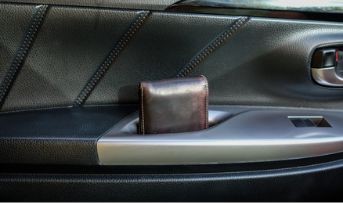
Here are a few items that you must never leave in your car
Buying a car was seen as a status symbol in the past. However, it has become a necessity over time. Considering the growing population, increasing traffic, and demand for luxury and convenience, cars have improved commutation in urban landscapes.
Most people spend long hours in their cars due to long-distance commutes. After completing the ride, remember a few items you should never leave in your vehicle.
1. Edibles:
It is natural to feel snacky during the day. Keeping snacks in your car for emergencies is a good idea, as long as you take them out when you exit the vehicle. When left for long hours, the food or drinks are subjected to the changing temperature inside the car, which may result in the growth of bacteria. The same applies to soda cans that have pressure within and may explode due to the external pressure from the car's cabin.
2. Aerosols:
Aerosols like hairsprays, deodorants, air fresheners, etc., are essentials. Keeping one in the car for short periods is acceptable. However, since the cabin's temperature keeps changing without artificial air conditioning when the car is not in use, you may find that your aerosol can has exploded all over your seats.
3. Plastic bottles:
Plastic bottles are a fire hazard to your car. It magnifies the sun rays pouring in through the windows or windshield and may result in setting your seats on fire. Such incidents are considered the owner's negligence and not covered by car insurance as admissible claims.
Even if the sun rays are not strong enough to ignite a fire, they will alter the composition of the plastic bonds in the bottle, which may result in harmful BPA exposure.
4. Flammable items:
Items like lighters must never be stored in cars. The fuel within such containers can expand due to the heat and result in a fire. Again, such fires are not within the scope of admissible car insurance claims. Therefore, it is essential to remember to remove flammable items from your car cabin.
5. Valuable goods:
While the other items on this list risk the car, valuable goods are what carjackers look for while determining which car to steal from. Ensure you take out any valuable goods like phones, headphones, portable chargers, laptops, and purses from your vehicle. Leaving an expensive item in the car makes it vulnerable to drawing the attention of burglars.
6. Items with specific chemical formulations:
Items like sunscreen and medication are scientifically manufactured with a specific composition of ingredients involving chemicals to ensure efficiency. Leaving such things in the heat will alter their formulation, making the goods toxic or causing a loss of efficacy.
7. Alcoholic drinks:
Heat leads to increased fermentation which ruins the flavour of alcohol. Additionally, alcoholic drinks are packaged with internal pressure to keep the liquor from altering while in transit before consumption. Excess heat is bound to make them explode.
While this list is not comprehensive, it is a general guideline for what you must not leave in the car. Generally, anything that may be affected due to high heat must not be kept inside the vehicle. Ensure that any important documents like your car insurance and registration are not left in the car. Take care of your valuables and avoid any considerable risks to your car.
Click HERE to buy the best car insurance in India.
Disclaimer: The information provided above is for illustrative purposes only. To get more details, please refer to policy wordings and prospectus before purchasing a policy.

Here are a few hacks to beat late-night snack cravings
How often have you heard someone advise you to brush your teeth to stop late-night cravings? Brushing your teeth will magically make you feel full and prevent you from wanting to eat something that will stain your sparkling whites. Although some people find this hypothesis true, it isn't true for everyone, especially if someone has bizarre cravings in the middle of the night.
Here are some tips for overcoming late-night cravings that can help you avoid having extreme cravings in the future.
1. Have good sleeping habits:
Although you may not be familiar with the term "sleep hygiene," it is crucial for getting a decent night's rest. Because of the numerous studies linking sleep deprivation to lowered metabolic function, hormonal abnormalities, and increased appetite, sleep plays a crucial role in increasing late-night cravings.
You'll have a better chance of getting a good night's sleep if you make your bedroom a calm, cosy place to sleep rather than staying up late yearning for junk food.
2. Eat a healthy breakfast:
A whole grain bagel or oatmeal are excellent first-step carbohydrates since they contain a lot of fibre. You'll feel full and satisfied for longer periods if you eat a breakfast rich in these nutrients. Preparing a few items in advance can be useful if you have a habit of rushing out the door in the morning to ensure you have a satisfying meal to start the day.
For meals to be enjoyed throughout the week, you may try eating hard-boiled eggs, baked oatmeal, overnight oats, or even a few veggies and nuts. These beneficial breakfast routines can help you stay full throughout the day and avoid late-night cravings.
3. Try something else:
According to research, cravings are nearly psychological and not physical needs. Although you don't need to eat, this does not mean that you should disregard it. The research also states that willpower is like a muscle that weakens throughout the day and becomes almost non-existent at night. Create a distraction to take your thoughts away from food. You can try chewing peppermint gum, as the studies suggest that menthol odours reduce hunger.
4. Enjoy a delicious supper:
Your body will feel satisfied and full for several hours after dinner with protein, healthy fats, and complex carbohydrates. This will likely stop any late-night cravings you have.
5. Take warm liquids:
When you're rushing around making supper and getting the kids ready for bed, it's easy to confuse thirst for hunger and to forget to drink enough water. Try a cup of herbal tea without caffeine or warm water with lemon if you're still hungry after supper. These naturally calorie-free fluids are hydrating while also making you feel full.
6. Exercise your brain:
Put a mental barrier between yourself and the craving. Stop and give yourself a pep talk to control your emotions. As you picture "moving away" from your hunger, tell yourself that it is "only an idea."
7. Portion out your snack if you're hungry:
You've done everything you can to avoid feeling ravenously hungry at the end of the day, including eating filling meals, getting enough sleep, and paying attention to your body. This can occur occasionally! If it is late and you are still hungry, don't be too hard on yourself. Do yourself a favour and divide whatever you intend to eat. You may even try healthy snack suggestions if you want to feel satiated rather than hungry after eating.
These tips guide you to avoid disturbing your sound sleep due to the constant urge to eat something at night. Bring these tips into practice and adopt a healthy routine with lower bloating risks.
Also, consider investing in health insurance to keep yourself mentally and financially strong during medical emergencies. An all-inclusive health insurance plan will pay for hospitalisation, childcare operations, medical care received at home (domiciliary hospitalisation), and ambulance fees, among other things. Buy yours today without any delay!
Click HERE to buy health insurance for you and your family.
Disclaimer: The information provided above is for illustrative purposes only. To get more details, please refer to policy wordings and prospectus before purchasing a policy.
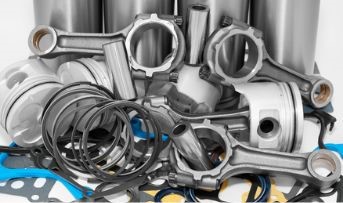
What characteristics or ways are helpful in spotting fake spare parts
Repair and service of your vehicle can be daunting and more challenging if the damage is so severe that some parts might need replacement. But, the introduction of fake spare parts for automobiles is posing a threat to the longevity of the vehicles and depreciating their value over time. Recognising a fake spare component is challenging because the phoney industry is evolving quickly.
Companies are striving to enact severe punishments against the manufacturers of these counterfeit parts. Still, there is a large part that you might encounter. How can you distinguish a fake from a real one? The characteristics listed in this article can help you identify genuine or bogus spare parts.
1. Check the serial number and hologram: A specific serial number is linked to all OEM/OES authentic auto spare parts. It will be helpful to trace a piece back to its source, allowing the part's authenticity to be confirmed. In India, you can also find a unique hologram of the company that makes the auto parts, which makes them impossible to replace.
2. QR code:
Most spare parts have a QR code that a smartphone may read to verify that the part is authentic. This unique QR code helps maintain product tracking and get all the required details about that part right from its manufacturer, the manufacturing date, model number, and more.
3. Check brake pads:
These are crucial components of a car's brake system. A false brake pad typically deteriorates quickly and unevenly. Also, fake brake pads can quickly fall apart because the materials used are of poor quality and have less resistance factor. These bogus brake pads wear out too soon, causing the brakes to fail.
4. Electricity risks:
Electrical component failure is a significant cause of car fires. And when they are examined, it is typically discovered that these automobiles have electrical parts that are phony or counterfeit. Such components may be dangerous since they may not comply with industry standards and might turn risky due to the chances of a blowout at any time.
5. Uncommon packaging:
It is important to understand the packaging of parts before purchasing them. Stay alert regarding the regular packaging of that part and the one you receive. Fake parts are delivered in unusual packaging and boxes. You must be able to differentiate between them and look out for company branding, the model number, and other essential information imprinted on the auto part. Call the dealer immediately if you feel something fishy.
6. Huge price differences:
Finding a deal is one thing, but if you notice parts being offered at an outrageous discount, like 90%, there is a very strong likelihood that they are fakes. Always do a price comparison, ensuring you get the original product.
7. Always visit an authentic and authorised centre:
It is advised to visit only the company-authorised centres to purchase genuine spare parts. These centres are approved by that particular vehicle brand and get an exclusive dealership to provide genuine products and the best customer service. Also, you can always connect to the centre if you face any problem with the part. Don't forget to get the bill and other important documents like the warranty card, user manual, and more.
You are responsible for informing the manufacturer once you discover that spare parts are fake. The body that considers these complaints will take appropriate action against the seller. They take the counterfeit parts and ensure they don't reappear on the market.
Additionally, ignore anyone trying to sell you fraudulent parts by claiming they are identical and will save you money. This little bit of money you might be able to save right now could lead to something dangerous. Good quality and original spare parts will help you increase the life of your vehicle. Take your car to regular servicing, do proper maintenance, and buy the best car insurance in India to keep it in the best shape.
Click HERE to buy the best car insurance in India.
Disclaimer: The information provided above is for illustrative purposes only. To get more details, please refer to policy wordings and prospectus before purchasing a policy.
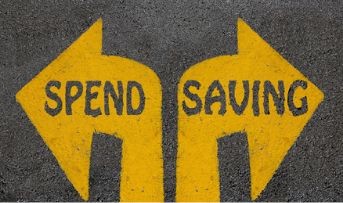
Here are a few clever ways you can avoid overspending on food when travelling
Travel is a favourite bucket list item for most people who aspire to discover new opportunities, savour offbeat experiences, introspect and grow holistically. With general insurance covering the financial burden of accidents that may happen while travelling, it has become easier and safer to travel than ever before.
Despite the ease of travel, most people end up postponing plans indefinitely or even cancelling due to budgeting issues. Overspending while travelling can have a significant impact on your finances. However, pinching every penny ruins the joy of the experience. Therefore, it is essential to find a balance, make careful estimates, and use tricks that save money on regular activities.
Food is one such expense that adds to the joy of travel. However, it is easy to overspend on food while travelling. Here are some smart ways that can help you save on food.
1. Complimentary breakfasts:
Usually, breakfast is included in the cost of the room. It is an overlooked service that can save you a sizable sum throughout your stay. Most hotels provide good-quality breakfast spreads that give you a taste of the local cuisine and international foods.
2. All-you-can-eat buffets:
These buffets can save you a lot of money if you travel with large groups or have a voracious appetite. Instead of purchasing individual menu items in fancy restaurants, it is significantly cheaper to head to a buffet restaurant that specialises in a specific food type- meat, pasta, or pizza, for example. These restaurants can be easily found by a quick internet search.
3. Avoid tourist-catered restaurants:
Tourists often travel without prior research and pay exorbitant rates for items sold at prime locations. An example is the restaurants in tourist-centric areas like the city centre or nearby tourist attractions. These restaurants charge high prices and exploit tourists who don't know the actual cost. It is best to avoid such centrally located restaurants and instead research and find local restaurants to get a taste of authentic cuisine at reasonable prices.
4. Stash your snacks:
Have you ever experienced hunger outdoors without having a snack prepared, and the only available options are overpriced foods you would not otherwise purchase? Imagine that in a foreign place where you end up paying heavily.
In desperate times, we purchase unnecessary things at unreasonable prices that do not truly satisfy our needs. To avoid this, carry a few snacks with you. This helps tide over time between two activities and prevents you from wasting money on overpriced snacks.
5. Allocate one meal a day for dine-out:
It is tempting to dine out for all meals while on vacation. However, this leaves a massive dent in your wallet. The easiest way to overcome this obstacle is to define a meal to eat at a local restaurant each day. Preferably, this should be lunch to get the most value for your money. Complimentary breakfasts and grocery stores or cooking for dinner make it easy to follow this rule.
6. Opt to cook:
If you're booked into a hostel, or your hotel room provides the equipment you can use to cook, ensure that you make full use of them. This can help in cutting down food expenses substantially. In case neither of these options is available to you, choose to purchase freshly prepared sandwiches or similar quick fixes from grocery stores or local bakeries.
Ensure that the food is safe to eat by thoroughly checking the expiry dates to prevent any issues that may lead to illnesses, irrespective of whether or not your travel is covered under your general insurance.
With some planning and research, you can limit your food expenses without adversely affecting your travel experience and preventing you from travelling. Think like a local, and you can significantly reduce expenses. However, you must pay attention to purchasing comprehensive general insurance covering accidents while travelling.
Click HERE to buy the best general insurance policy before your next trip.
Disclaimer: The information provided above is for illustrative purposes only. To get more details, please refer to policy wordings and prospectus before purchasing a policy.
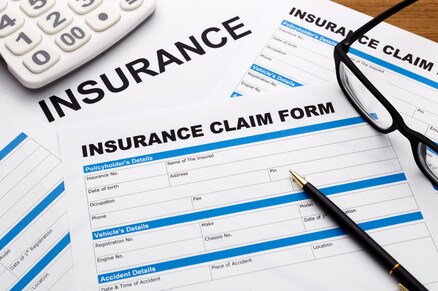
Learn About the Insurance Claims Process
Let’s address the big question, how to go about a claim?
The information on this page covers the part that you're most concerned about: Claims.
Our claim settlement ratio is something we're really proud of. Trust us, we are equally eager to settle your claims, should there be an untoward situation. Call us on 1800 266 3202 for seamless claim support.
Some important points related to the claims process:
For motor insurance claims, you can send us a video of the damaged vehicle taken from your smartphone, through the link that we share on your registered mobile number. You can also get in touch with your agent, visit our nearest branch or email us at customercare@magma-hdi.co.in for speedy assistance.
We promise you – we'll never leave you stranded. Our 24*7 Roadside Assistance add-on will help you with vehicle pick-up, repairs, and several other services (only if this service is opted for). For repairs, we urge you to choose our preferred workshops / network garages (where we'll settle the bill directly with the garage) or even if you don't, we'll settle the payment based on the relevant invoices and documentation (if only it is admissible under the terms of the policy).
To check the preferred garages near you, please click
For health insurance claims, in case of planned admission, we request you to inform us or your agent before the hospitalization, this will help us to process your claims quickly. Kindly intimate your claim within 30 days of hospitalization. You can avail yourself of the cashless facility at any of our Network hospitals.
To check the network hospitals near you, please click
You can also download our "Magma HDI" mobile app from the Google play store or Apple app store or visit our website www.magmahdi.com for the following services:
1. Intimate and track claims
2. Avail wellness services
3. Download claim forms
4. Search hospital for a cashless
5. Access your policy facility features and health card, and more
For more clarity, we have summarized a few points to know why health claims get rejected, click here to view our blog.
We've reached the end of this page. See how quick that was!
To register your claim, click
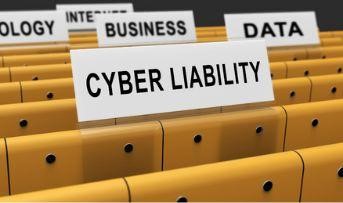
Will the surge in cyber-attacks affect the premium rates of cyber insurance
Modern problems require advanced solutions. If you've been on the internet for a while, you've heard about cyber-attacks. With the increased dependence on digitalisation, cyber-attacks are an enormous threat to the growth of any business. Cyber-attacks affect the devices on the company's network and infringe on its data reserves. It puts the organisation at the mercy of hackers who can gain control over its valuable digital assets.
A conservative cover like a public liability insurance policy may not suffice in such instances. Commonly known to cover any physical injuries and third-party damages on owned property, a general liability insurance policy is necessary for every business. However, it does not cover cyber-attacks, making it essential to purchase an individual plan.
This blog discusses the correlation between rising cyber-attacks and the recent hikes in premium rates.
Understanding cyber insurance:
The recent Covid-19 pandemic highlighted a business's digital presence like never before. With many risks like malware attacks, compromised emails, and attacks on software and hardware devices, insuring a business is crucial. Cyber insurance is the perfect tool to combat such contingencies to prevent sudden operations interruptions from manufacturing up to the delivery stage. Cyber insurance is a rapidly growing segment of the Indian insurance sector.
Insurance premiums and assets covered under the policy:
The potential of digital assets is unimaginable. They are highly valued compared to physical assets like machinery. The insurance segment presently covers a small percentage of businesses, including banks, non-banks, and information technology services companies that comprehend the need for the cover. These organisations are heavily dependent on their pool of digital assets.
The high premium amount is a distinguishing factor that sets cyber insurance apart from most insurances. While common insurances like health, motor, or fire insurance are significantly low compared to the cover value, cyber insurance has a very high cover, up to 200 crores depending on the industry and the valuation of the business.
These high premium values are marginal compared to the asset valuations covered under the insurance. Typically, the assets covered under the policy are 50-100 times the value of the annual premium paid. The premium amount is determined after studying multiple factors like the company's turnover, cyber-attack risk, and availability of backup infrastructures.
Insurance premium trends:
As the demand for the product increases, so does its price. With reputed insurance providers stating that the Indian cyber insurance market has a projected growth of 35-50%, the rising trends in premium amounts do not come as a surprise. The high rate of uncertainty and dynamic environment with new cyber threats frequently emerging has caused a steep increase in premiums.
While some reports and insights by experts suggest that the increase is by 50%, there is reasonable evidence to believe that the growth may be closer to 100%. Despite the exponential increase in premium amounts backed by expansion in demand, the need for cyber insurance continues to grow. While the policy was taken by only big corporations earlier, smaller businesses of varying natures are assessing the risk of being unprotected in such volatile conditions and are willing to pay the high premium amounts, which do not seem to stabilise or decrease any time soon.
While the penetration rate of cyber insurance policies is not as high as any general public liability insurance policy, the need is bound to continue creating a demand for the insurance and fuel higher premium rates in proportion to the risk shouldered by the insurance providers.
Click HERE to buy the best public liability insurance for your business.
Disclaimer: The information provided above is for illustrative purposes only. To get more details, please refer to policy wordings and prospectus before purchasing a policy.
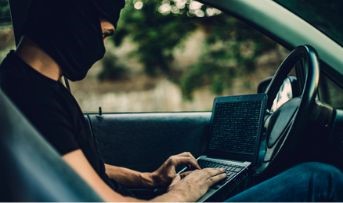
Minimise the risk of your car getting hacked with these smart tips
For most Indians, purchasing a car is a significant milestone. It is an asset that requires heavy investment, offers convenience, and doubles as a status symbol. Over time, alternate mechanisms of protecting your car against uncertainties have emerged. These mechanisms provide owners with greater security features. One such upgradation is that of smart vehicles. While advanced tech-powered features make the driving experience safer and smoother, they also raise cybersecurity concerns.
For a vehicle that holds such significance, it is necessary to buy car insurance policy online to protect it against accidents and financial worries.
Here are some tips to prevent your smart car from getting hacked:
1. Regular updates
Cars are getting smarter by the day as manufacturers race toward developing the best systems for their automobiles. With such rapid developments, installing those updates in your vehicle becomes necessary. This can be done during your vehicle's servicing at an authorised service centre at no additional cost.
2. Secure your fob
A key fob, also known as a fob, is a common feature in the latest car models. It replaces a traditional key and facilitates keyless access to your car through electronic signals by pressing a button. While this makes opening your vehicle easier, hackers have found ways to unlock your car even when the fob is not nearby by cloning the signal using an e-signal amplifier.
Consider using a specific fob holder that protects it against hackers to prevent such signal-altering tactics. Additionally, consider purchasing an add-on key protection cover. This ensures greater protection of your vehicle and allied tools. Also, remember to buy car insurance policy online as an additional layer of protection for your car.
3. Keep an eye on Bluetooth connectivity
Bluetooth connectivity has been around for a long while, and its scope of use has expanded to other electronics than just personal communication devices. While connecting your phone to your vehicle can make drives entertaining with music or navigating easier, turn off your vehicle's Bluetooth to ward off hackers' prying eyes when not in use. Not only can they access valuable data, but re-alter routes and pose a threat to your safety.
4. Embedded firewalls
With connectivity gaining significance, car manufacturers offer multiple mechanisms to transmit data directly between owners' devices and vehicles. Do not allow communication or connectivity access to any unauthorised devices. You can install a firewall that eliminates communication attempts from unknown vehicles or devices.
5. Smartphone connectivity
As we become increasingly dependent on your smartphones, they are also doubling as an alternative to keyless entry to your car. Ensure your smartphone is secure before connecting to your vehicle using the manufacturer's authorised app. Any existing malware may prove to be an issue in the long run. Therefore, for the security of your vehicle and personal data, check for any signs of malicious intent, unauthorised apps, and data packages on your phone before you connect it to your car.
6. Avoid third-party updates
You must only install or modify your car's software approved by the manufacturer. If you install any new updates through a third party, you may encounter issues with your car's functioning and create loopholes that hackers can use to manipulate your vehicle's processing.
With smart features rolling out daily, it is inevitable to eliminate cybersecurity threats, even when it comes to cars. Consider this when comparing options to buy car insurance policy online to find the best one that offers comprehensive protection against hackers, accidents, and more. Feel free to contact a cyber expert if you feel that the situation might get critical. Stay alert and try to gain fundamental knowledge about the potential risks to your car's safety due to hacking attempts.
Click HERE to buy car insurance policy online.
Disclaimer: The information provided above is for illustrative purposes only. To get more details, please refer to policy wordings and prospectus before purchasing a policy.
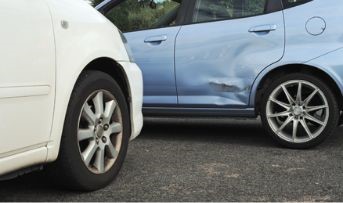
Not responsible for the accident? Here's what you should do
The numbers of road accidents in India are astonishingly increasing every year for many reasons, including drunken driving, being careless at the wheel, driving without attention, not following traffic rules, etc. Regardless of the reasons surrounding the road accident, you need to be extremely cautious on the road. You should also buy car insurance policy online, not as a mandate but as a comprehensive protection for your vehicle.
A lot of times, challenging situations may occur regarding road accidents, even if you are not at fault. Sometimes you may be accused of an accident you have no connection with. If you're not responsible for the accident and wondering what to do? You need not panic. We have curated this article to help you determine your next steps if you're not responsible for an accident.
What are the immediate steps?
Your immediate action plan should be:
● Try to stay calm before taking over the situation
● Call an ambulance if you or anyone involved in the accident is hurt
● If the cars are damaged, you should also call the police
● Make the drivers aware of the insurance coverage
● Take pictures of the vehicles involved in the accident
● Wait for the officials and car insurance companies to decide the next steps
● Do not panic and blame others
What to do if you are not responsible?
A car accident can be extremely stressful and anxious situation, so you must maintain your composure and pick your battles wisely. Some tips to help you deal with it are
1. Gather information:
You need to get important information like the name and address of the other driver. You should also take pictures at the accident scene. Collect photos of the damage to the involved cars, the number plate of the at-fault car, and then the driver's driving licence. Try to note down the statement of the passengers and witnesses.
2. Inform your insurance company:
Your insurance company should get involved in such a situation. But you must be very quick in submitting your details and proofs to your insurer (probably in the first 24 hours of the accident). The insurer of the at-fault driver may hold you guilty of the situation. Fret not! You should just state the facts, statements, and pictures for them to decide. You should also inform your insurer as it will establish your reputation as a good-faith citizen. They can also protect you if the other insurance company denies your claim.
3. File a legal claim if necessary:
Legal claims can be tedious. You need to choose that very wisely. You must only go for a legal claim if the extent of damage is massive. You are eligible for a legal claim when the other person's insurance company denies your claim and does not give you compensation. You can fight this with the other insurance company for rightful compensation.
However, if you are seriously hurt, you need a lawyer to fight your claim. Things can get pretty intense, and you need to choose everything with caution.
If you get into a car accident that you weren't responsible for, you should collect information on-site as much as you can. This will give you an upper hand. You can also claim their liability insurance. If you buy car insurance policy online, you will be covered against all the losses you encounter after a car accident. But, all of this should happen swiftly without any delays. You can win the situation only if you act fast and present your case strongly.
Click HERE to buy car insurance policy online.
Disclaimer: The information provided above is for illustrative purposes only. To get more details, please refer to policy wordings and prospectus before purchasing a policy.
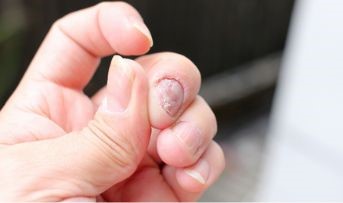
Nails: An overlooked indicator of good health
Good health is considered to be our greatest gift. It results from practising healthy habits, including eating nutritious and well-balanced meals, sleeping on time, and exercising daily. These contribute towards a balanced and wellness-focused lifestyle that is exceptionally significant in the long run.
While your habits can help minimise the risk of illnesses and facilitate overall wellness, there is no practical way to prevent diseases. However, prudent mechanisms like buying health insurance online in India and conducting regular health checks can help maintain your well-being.
As astounding as it may sound, your nails can say much about your body's health in no time. You may not believe it at first, but this article on various parameters of nail health and what they may indicate is all you need to learn more about the topic!
1. Yellow nails:
Yellow nails indicate various things, including wearing nail paint frequently. In such a case, you need to take a break from the salon. Your nails may also turn pale yellow as a result of old age. Another significant cause may be excessive smoking.
Additionally, it could also be an indicator of yellow nail syndrome. It is a rare genetic disorder that causes thick yellow nails. If you notice that your nails are yellow for an extended period, consider getting them checked immediately.
2. White spots:
White spots are extremely common in nails. You can find these white spots scattered across your nails. Contrary to popular belief, it does not indicate a calcium deficiency. Instead, it could be the result of a minor nail accident. It could also be a symptom of leukonychia. It is harmless but may indicate other health problems, including liver or kidney issues. If you notice such white spots regularly, the best action plan is to consult a doctor soon.
3. Brittle, cracked, or dry nails:
Dry and cracked nails are extremely common in recent times. A dry nail plate causes dry nails. It can result from swimming, dishwashing, or excessive use of nail polish remover. Reduce the frequency of these activities to prevent dry nails. Low humidity could be another cause of this condition. It can also occur due to old age.
However, brittle nails can also be an indicator of hypothyroidism. Since it is difficult to gauge the root cause of the problem without medical intervention, we encourage you to consult a medical professional who can help diagnose the problem. To reduce the burden of hospitalisation expenses on yourself, you must buy online health insurance. If your tests do not indicate a significant problem, using lotions to keep your nails moisturised may suffice to correct the issue.
4. Blue nails:
If your nails turn blue frequently, it can mean that your body is not getting enough oxygen. This severe problem could also result from underlying heart and lung problems, requiring immediate medical attention.
5. Nail clubbing:
Frequent swelling and curving of the nails can result from serious issues like lung disorders and kidney issues, for which you need to consult a doctor immediately.
Many diseases and abnormalities can change your nails' colours or cause them to grow abnormally. All these are indicative of other ailments that may prevail in your body. You must consult a doctor immediately if you notice such signs and symptoms. Do not overlook these signs. Be responsible and ensure regular check-ups to keep your body in the best shape. You should also buy online health insurance to stay ahead and protect your health with comprehensive coverage.
Click HERE to buy online health insurance.
Disclaimer: The information provided above is for illustrative purposes only. To get more details, please refer to policy wordings and prospectus before purchasing a policy.


